

The Official Publication of the Association of Arkansas Counties Find key dates and deadlines FISCAL SESSION ON HORIZON Page 5
2024 County Lines County Lines
Winter


ASSESSOR
ADDRESSING
VOTING
ROAD & BRIDGE • EMERGENCY MANAGEMENT
GIS MAPPING USER FRIENDLY INTEGRATION
Office specific extensions tailored to your day-to-day business needs. Map parcels, address points, roads, pavement issues, voters, and so much more!
Easily create, edit, and export items at anytime from anywhere. The site is mobile-friendly and backed by our unparalleled customer support team.
Real-time access to the local, state, and federal data sources you need to make informed decisions.
Bringing everyone and everything together.
Contact sales@datascoutpro.com • 888.565.4530 x.3
•
•
• LAW









DIAL 8 888-8888 Little Rock Conway Jacksonville Hot Springs Springdale Bryant Memphis Responsible Attorneys: Mike Rainwater & Bob Sexton EXPERIENCE. COMPASSION. RESULTS. ANYWHERE IN THE STATE...

ROADS LEAD TO STRONGER COMMUNITY.
A community’s roads connect us to jobs, healthcare, daily essentials, friends and family — and home. Ergon is proud to provide the materials and support needed to help build and maintain safe roadways across America, connecting us all to what matters most.
Features A Year in Review...............................................................................26 Caring for Mental Health a Top Priority.....................................30 ARORP Launches ReviveAR App................................................33 AAC Scholarship Application......................................................35 Meet Your Board Members: Brandon Ellison...............................36 Meet Your Board Members: Debra Buckner................................36 AAC Staff Profile: Jim Grinder.....................................................37 AAC Photo Recap: Treasurers.....................................................38 AAC Photo Recap: Assessors.........................................................39 AAC Photo Recap: County Clerks...................................................40 AAC Photo Recap: Sheriffs.............................................................41 AAC Photo Recap: ARORP Training...............................................42 AAC Photo Recap: Collectors..........................................................43 Departments From the Director’s Desk...................................................................7 President’s Perspective.....................................................................9 AG Opinions.......................................................................................12 AAC Research Corner.......................................................................14 Seems to Me.....................................................................................18 Legal Corner......................................................................................20 Governmental Affairs......................................................................21 AAC Risk Management Services...................................................22 AAC Litigation Lessons....................................................................23 News from NACo...............................................................................44 In
Cover Notes: Fiscal Session on Horizon Cover Photo
Ray Tan/istockphoto 2024 Fiscal Session Dates and Deadlines March 6 — Pre-fiscal session budget hearings March 11 — Pre-filing. Non-appropriation bills may not be pre-filed prior to a Fiscal Session. April 10 — Fiscal Session Convenes April 10 — Deadline for filing Identical Resolution for non-appropriation bills April 24 — Deadline for filing appropriation bills April 24 — Deadline for filing non-appropriation bills May 9 — Fiscal Session ends unless it is extended by a vote of 3/4 of the General Assembly. The session may be extended only one time, not to exceed 15 days. COUNTY LINES, WINTER 2024 5
This Issue WINTER 2024
by:
2024
March 26-28
Circuit Clerks
Fairfield Inn & Suites, Benton
March 27-29
Judges
Hot Springs Convention Center, Hot Springs
April 13
AAQC 75-Member Board AAC, Little Rock
April 23 Supervisor Bootcamp AAC, Little Rock
May 6-8
County Clerks
Graduate Hotel, Fayetteville
May 22-24
Collectors
Mt. Magazine Lodge, Mt. Magazine
June 2-4
Sheriffs
Wyndham, Fort Smith
June 4-6
Circuit Clerks
Winthrop Rockefeller Institute, Petit Jean Mountain
Calendar activities also are posted on our website: www.arcounties.org
Contact AAC
Chris Villines, Executive Director cvillines@arcounties.org
Anne Baker, Executive Assistant abaker@arcounties.org
Loretta Green, Receptionist lgreen@arcounties.org
Eddie A. Jones, Consultant e.jonesconsulting@gmail.com
Mark Whitmore, Chief Legal Counsel mwhitmore@arcounties.org
Colin Jorgensen, AAC Litigation Counsel cjorgensen@arcounties.org
Josh Curtis, Governmental Affairs Director jcurtis@arcounties.org
Lindsey French, Legal Counsel lfrench@arcounties.org
Christy L. Smith, Communications Director csmith@arcounties.org
Sarah Perry, Communications Coordinator sperry@arcounties.org
Michael Roys, ACE Program Coordinator mroys@arcounties.org
Cindy Posey, Accountant cposey@arcounties.org
Jenny Evans, Accounting & Program Assistant jevans@arcounties.org
AAC Mission Statement
The Association of Arkansas Counties supports and promotes the idea that all elected officials must have the opportunity to act together in order to solve mutual problems as a unified group. To further this goal, the Association of Arkansas Counties is committed to providing a single source of cooperative support and information for all counties and county and district officials.
The overall purpose of the Association of Arkansas Counties is to work for the improvement of county government in the state of Arkansas. The Association accomplishes this purpose by providing legislative representation, on-site assistance, general research, training, various publications and conferences to assist county officials in carrying out the duties and responsibilities of their office.
1415 West Third Street Little Rock, AR 72201 (501) 372-7550 phone / (501) 372-0611 fax www.arcounties.org
Mark Harrell, IT Manager mharrell@arcounties.org
Jim Grinder, Cyber/Network Security Engineer jgrinder@arcounties.org
Risk Management/ Workers’ Compensation
Debbie Norman, Risk Mgmt. & Insurance Director dnorman@aacrms.com
Misty Petrus, Workers’ Comp Claims Mgr. mpetrus@arcounties.org
Cathy Perry, Program Analyst cperry@aacrms.com
Kim Nash, Workers’ Comp Claims Adjuster knash@aacrms.com
Renee Turner,Workers’ Comp Claims Adjuster rturner@aacrms.com
Jacob Trumble, Claims Analyst jtrumble@arcounties.org
Greg Hunt, Claims Analyst ghunt@aacrms.com
Kim Mitchell, Premium Analyst kmitchell@aacrms.com
Karen Bell, Program Assistant kbell@aacrms.com
Ellen Wood, Admin. Asst./Receptionist ewood@aacrms.com
Brandy McAllister, RMS Counsel bmcallister@arcounties.org
JaNan Thomas, RMS General Counsel jthomas@arcounties.org
Melissa Dugger, RMS Litigation Counsel mdugger@arcounties.org
Aaron Newell, RMS Litigation Counsel anewell@arcounties.org
Jennifer Merritt, RMS Litigation Counsel jmerritt@arcounties.org
Mallory Floyd, RMS Employment Counsel mfloyd@arcounties.org
Fonda Fitzgerald, RMS Paralegal ffitzgerald@arcounties.org
Elizabeth Kellar, RMS Paralegal ekellar@arcounties.org
Samantha Wren, RMS Assistant swren@arcounties.org
Erica Archer, RMS Legal Assistant earcher@arcounties.org
Ashley Pursell, RMS Admin. Assistant apursell@arcounties.org
James Mirus, Member Services Manager jmirus@arcounties.org
6 COUNTY LINES, WINTER 2024
AAC CALENDAR
County Lines
County Lines [(ISSN 2576-1137 (print) and ISSN 2576-1145 (online)] is the official publication of the AAC. It is published quarterly. For advertising inquiries, subscriptions or other information, please contact Christy L. Smith at 501.372.7550.
Executive Director/Publisher
Chris Villines Communications Director/ Managing Editor
Christy L. Smith Communications Coordinator/Editor
Sarah Perry
AAC Executive Board:
Debbie Wise – President
Brandon Ellison – Vice President
Jimmy Hart – Secretary-Treasurer
Tommy Young Deanna Sivley
Debra Buckner Dana Baker
Kevin Cleghorn Terry McNatt
Rebecca Talbert Doug Curtis
Gerone Hobbs Marty Boyd
John Montgomery Heather Stevens
Brenda DeShields Selena Blair
Bobby Burns
National Association of Counties (NACo) Board Affiliations
Debbie Wise: NACo board member. She is the Randolph County Circuit Clerk and president of the AAC Board of Directors.
Brandon Ellison: NACo board member. He is the Polk County Judge and vice-president of the AAC Board of Directors.
Ted Harden: Finance & Intergovernmental Affairs Steering Committee. He is a member of the Jefferson County Quorum Court.
Barry Hyde: Justice and Public Safety Steering Committee. Vice Chair of Transportation Steering Committee. He is the Pulaski County Judge.
Rusty McMillon: Justice and Public Safety Steering Committee. He is the Greene County Judge
Kevin Smith: IT Standing Committee. He is the Sebastian County Director of Information Technology Services.
Gerone Hobbs: Membership Committee. He is the Pulaski County Coroner.
Paul Elliott:Vice Chair of Justice and Public Safety Steering Committee, vice chair of law enforcement subcommittee. He is a member of the Pulaski County Quorum Court.
Ellen Foote: Community, Economic & Workforce Development Steering Committee. She is the Crittenden County Tax Collector.
Tawanna Brown: Telecommunications & Technology Steering Committee. She is the Chief Computer Operator for Crittenden County.
AAC DIRECTOR’S DESK
New developments
Ralph Waldo Emerson once penned, “The Earth laughs in flowers.” As we close the book on this winter, and turn toward the spring, it is a unique time to assess where we’ve been while looking ahead. And revel in the world’s laughter around us.
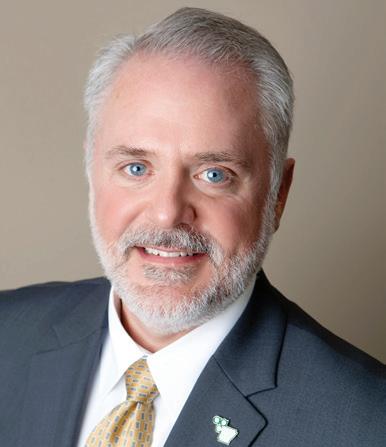
Not too distant in our rear-view mirror lies the COVID-19 pandemic. During my life, I never gave a second thought to the idea that our worst Hollywood nightmare could be the world we lived in, but that’s exactly what happened for a good two-year stretch. The world will never be the same, and our time and memories will be sorted to pre-, during and post-COVID lives.
I think we are in such a rush to leave behind those tumultuous times that a natural leaning toward the status quo is, at least for a while, the societal norm. Don’t be fooled. The world around us is moving faster than ever, and if you are standing still, you lose ground fast.
So, I applaud the vision for the future that our AAC Board of Directors has set, and I’ll fill you in on the details momentarily. But first I reflect on the irony that our 2020 AAC Annual Conference was themed “20/20 — A Perfect Vision of Arkansas Counties.” Well, that ship sunk pretty quickly.
As we’ve resumed our gait we’ve found some major opportunities before the Association. First, cyber security was a nebulous and faraway proposition. We all had firewalls but learned quickly through several events that this is our new front for defense. As a response, the AAC has hired a Network/Cyber Security Engineer — Jim Grinder. You will have a chance to meet Jim as we introduce him at upcoming association meetings.
Jim brings a wealth of security expertise with him and will work with you, your IT staff, and our vendors to proffer advice and help on training and security that we will all benefit from. We have an amazing cross-section of pragmatic intellect with you all, and communication connecting us all, sharing advice and learning from one another will be our defined goal with this position. With federal grant money made available at a statewide level, Jim will help maximize the utility of this revenue for the next few years.
Another opportunity is on the communications forefront. Some associations leading the charge in this arena are building out actual studios not dissimilar from local news sets. These are empowering those associations to share quickly and efficiently across multiple platforms. We are leaning into this technology and will soon have a facility you will be proud of.
Think preservation of training, like the bootcamps Mallory Floyd has been spearheading, available on video at any time for your office. Guest speakers like communications guru Mark Weaver. Jail trainings by JaNan Thomas and team. As a former collector, I remember the seasonal quiet of summer, and I would have loved to have additional training my employees could have gone through without leaving their desks. The slate is clean, I invite you all to dream with us about what kind of programming would best benefit you … and let us know.
Another opportunity has long-lain dormant next door to the Association. Three vacant lots, totaling approximately 1/2 of an acre, sat between us and the Arkansas Education Association (AEA). Our good neighbors to the west may very well have had plans at one time for that land, but it sat undisturbed year after year. In fact, Eddie Jones (who served on the AAC board for several years before becoming my predecessor), told me that for 30 years we’ve been wooing the AEA to listen to offers. Your AAC Board of Directors worked with me in a, shall we say, reinvigorated effort to purchase this property. After several meetings over several years, we have
>>>
Chris Villines AAC Executive Director
COUNTY LINES, WINTER 2024 7
now bought the vacant lot to our immediate west, and it is available for our development.
It is needed. In the last few years, we have gone from representing 42 of our counties in risk management to all 75. We’ve also grown our worker’s compensation program to handle all 75 counties as well. All voluntarily, and all because we provide the best service at the best price — and I offer a big thank you to Debbie Norman and her team because of this. In the meanwhile, we also took in house the lions-share of our legal defense and now have a formidable law firm under our roof, replete with paralegals, assistants, and all the accouterments that go with it.
We’ve undergone a major growth phase, going from about 20 to approximately 40 employees over the last 15 years — and my how the service to our counties has increased.
The time has come to grow again. And I invite you to join me in thanking our AAC Board for their vision and conservative financial steps. For years they have been setting aside resources allocated for future capital expansion — and the time is now. We will be providing more details to you in the coming months — and we look forward to the ability to grow cyber security, communications, and education with designated meeting space as well.
One thing I try to remind our groups when they come through new-elect training is that for the roughly 1,400 county
and district officials and for the 16,000 county employees across the state, our offices are your home. We look forward to making your home even more functional for you, and we always invite you to spend time with us in Little Rock. By virtue of being elected you are a part of something special. ***
April 8 is a few days away, but it marks the first time in over a century Arkansas has been in the path of totality of a solar eclipse. Some are calling it “Darkansas,” and I’ll have to buy that T-shirt. My prayers are with you all as we encounter hundreds of thousands of people not from here for what will prove to be a multi-day event. Thank you to all of you who have helped us as we’ve led in communicating potential county responses and activities. I believe our counties are mostly well prepared. Here’s hoping no problems lurk in the shadows.
***
Our 2024 annual conference is right around the corner. In coming days, you will receive a Save the Date postcard, including the annual theme. The conference this year is from Aug. 7-9 in Garland County, and we look forward to building another great event for you. I’ll leave you with one hint. Think stonewashed jeans.




AAC DIRECTOR’S DESK WE KEEP YOUR COUNTY Springdale Batesville Searcy West Memphis Fort Smith Hot Springs Little Rock Hope Texarkana, TX 9 locations in Arkansas! ROLLING TOLL FREE 877.786.4681 Check out our STM Arkansas stores! 8 COUNTY LINES, WINTER 2024
AAC PRESIDENT’S PERSPECTIVE
AAC scholarship deadline is May 1
It’s no secret that the cost of a college education has skyrocketed in the last several decades — so much so that college is out of reach for many students. The Association of Arkansas Counties (AAC) took a proactive step in 1985 when it established its Scholarship Trust. Through this trust, the AAC awards college financial assistance to the children, stepchildren and grandchildren of Arkansas county and district officials and employees. Since the trust was established, the AAC has awarded more than 300 scholarships totaling more than a quarter of a million dollars.
I encourage you to share this information with anyone in your office who may have a child, stepchild, or grandchild who will be attending college in the fall. The deadline to apply is May 1. You may access the application at https://www. arcounties.org/about-us/aac-scholarship/ or on Pages 33-34 of this magazine.
Scholarship recipients are selected based on the following criteria: applicants must plan to attend or is already attending college; must have a financial need; must have a grade point average of 3.0 or above and a minimum ACT score of 18; must be or will be a high school graduate in the state of Arkansas; and must be a child, grandchild, adopted child, or stepchild of a current or retired county employee of Arkansas.
The AAC currently awards 12 scholarships of $2,000 each per year. Three of those 12 are memorial scholarships — the Randy Kemp Memorial Scholarship, the Matt Morris Scholarship, and the Jonathan Greer Memorial Scholarship.
Randy Kemp was the first AAC Communications Director, serving from July 2008 until his death in August 2011. The scholarship is funded exclusively by the annual Randy Kemp Golf Tournament.
The Matt Morris scholarship was established following the death in 1999 of Matt Morris, son of former Searcy Mayor David Morris, who is a former AAC employee. Matt was an Arkansas Razorback baseball recruit. The scholarship is funded by donations made in Matt’s name and by the County Judges’ Association. It is awarded each year to an applicant who exemplifies Matt’s character, either through their sports involvement or by helping others.

Jonathan Greer was a staff attorney at the AAC and the liaison to the Quorum Court Association when he tragically passed away. The Arkansas Association of Quorum Courts established this scholarship in Jonathan’s memory to be awarded each year to a deserving student.

Along with the AAC, the following county associations contribute to the scholarship trust annually: The County Judges Association of Arkansas, the Arkansas County Clerks Association, the Arkansas Circuit Clerks Association, the County Collectors Association of Arkansas, the Arkansas County Treasurers Association, the Assessors Association of Arkansas, the Arkansas Association of Quorum Courts and the Arkansas Sheriffs’ Association.
The judges, county clerks, circuit clerks, collectors, treasurers, sheriffs, assessors also offer scholarships separate from the AAC scholarship. You can find many of these applications in the Publication Library on the AAC web site. You can find out more about the sheriffs’ scholarship on the Arkansas Sheriffs’ Association website.
So, there are many avenues available to help pay for a college education. Again, please share this information with anyone in your courthouse who may have a qualifying dependent and submit those applications by May 1.
Debbie Wise
Randolph County Circuit Clerk / AAC Board President
DEBBIE WISE
AAC Board President; Randolph County Circuit Clerk
Debbie Wise
75 Counties - One Voice COUNTY LINES, WINTER 2024 9










The Future of Tax B I L L I N G & C O L L E C T I O N S O L U T I O N S S E R V I C E S O F T W A R E S A T I S F A C T I O N E X P E C T M O R E Browser Based Full Credit Card Integration Fully Documented Multi-payment Processing Unlimited History Public Inquiry Exportable Data Multiple Annual Updates gowithtaxpro.com info@gowithtaxpro.com (501) 246-8060

Shop Statewide Contracts.
Arkansas’s official statewide purchasing cooperative program, ARBUY, makes purchasing through statewide contracts simple. And it’s completely FREE to county governments. Contact us to start shopping today.
SAVE MONEY | SAVE TIME | ENSURE COMPLIANCE | SHOP STATEWIDE CONTRACTS Start shopping contracts Scan the QR code Questions? Please contact: Reid Hall Government Account Manager reid.hall@mdfcommerce.com 501-993-4922
From digital asset mining operations to automatic license plate readers
AG OPINION NO. 2023-060
This opinion concerns Act 851 of 2023, the “Arkansas Data Centers Act of 2023.” Question 1: If a city or county does not have a digital asset mining operation functioning in their city or county, can they prevent permitting or building [of a digital asset mining operation] through ordinance? No, a city or county cannot prevent a new digital asset mining operation through an ordinance that bans digital asset mining. Local ordinances that conflict with state law are invalid. With Ark. Code § 14-1-604(a), the General Assembly enacted protections for digital asset mining businesses, and local governments cannot ban them entirely. But digital asset miners still must follow local ordinances concerning operations and safety and general sound pollution limits. Even so, local governments cannot regulate digital asset mining businesses differently than data centers. Thus, any ordinance for digital asset mining operations must also apply to data center operations. Question 2: Is a city or county prohibited from enforcing existing sound and/or noise guidelines if digital asset mining is currently operational in their jurisdiction? No, under Ark. Code § 14-1-605(a)(1), the Arkansas Data Centers Act expressly allows local governments to (1) enforce sound pollution regulations in place before the Act went into effect and (2) enact and enforce “limits set for sound pollution generally.”
AG OPINION NO. 2023-072
The AG expounded on the release of public records or withholding of confidential records concerning juveniles. Ark. Code § 9-27-309(j) lists four types of juvenile records that must be withheld from release: arrests; detention; proceeding under this subchapter; and of an investigation that is related to an offense that occurred while the offender was a juvenile. Those types of records must be withheld and kept confidential unless one of the following conditions are met: a written order of the juvenile division of circuit court authorizes the release; the juvenile has been or is being formally charged in the criminal division of circuit court for a felony resulting from the arrest or the proceeding; or the records being released are otherwise allowed to be released under Ark. Code § 9-27-309 or Ark. Code § 9-27-320. The AG also noted that Ark. Code § 27-53-202 requires accident reports to include the names and addresses of passengers occupying a vehicle at the time of an accident. However, their names and addresses should be redacted unless the requester is one of the named individuals on the accident report. This has not been interpreted to mean that all individuals that may appear in a police report, videos, or photographs be withheld or redacted.
AG OPINION NO. 2023-056
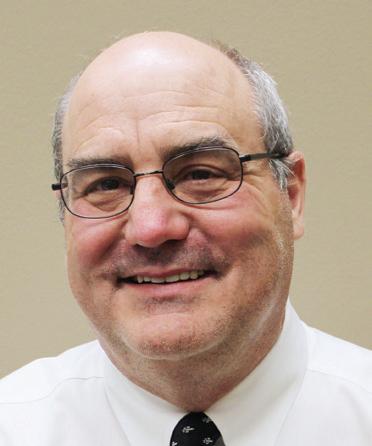 Mark Whitmore Chief Legal Counsel
Mark Whitmore Chief Legal Counsel
The AG interpreted the Arkansas Underground Facilities Damages Prevention Act, Ark. Code § 14-271-101 et seq. The AG concluded that the law effectively and categorically requires that before an entity begins excavating, it must verify the location of utilities though the One Call Center’s electronic positive response system. The law does not authorize exceptions to this process. This remains true even if the utility is not located within the prescribed time provided under the law. Without completing the confirmation process, the excavator risks civil penalties and liability if it damages an underground facility during excavation. Similarly, the operator’s failure to respond and fulfill the obligations under the act in the time prescribed by law exposes the operator to civil penalties for violating the law and liability.
AG OPINION NO. 2023-063
The AG expounded on Attorney General Opinion No. 2023-030 and concluded that political parties do not need legislation to hold a closed primary. Closed primaries are constitutional. The AG explained that the state law allows political parties to adopt rules setting forth the prescribed qualifications for voting. This remains the law despite the fact or aspect that the state funds the party primary. The use of state funds to fund a closed party primary does not violate the public purpose doctrine. Primaries are part of the election process, accomplish important goals that benefit the public, and have a public purpose.
AG OPINION NO. 2023-091
The AG explained that a county, city or municipal entity may use an automatic license plate reader (ALPR) only as authorized under Ark. Code § 12-12-1803(a): to compare and capture plate data with the data held by the Office of Motor Vehicles, the Arkansas Crime Information Center, the National Crime Information Center, databases held for the purposes of an ongoing investigation, and the Federal Bureau of Investigation for any lawful purpose. Parking enforcement entities may use ALPR systems to regulate parking; ALPR may be used to control access to secured areas; and the Arkansas Highway Police may use ALPR to electronically verify registration, logs, and other compliance data. Arkansas law does not allow private businesses or non-public entities to use ALPR systems for any purpose.
AAC AG OPINIONS
12 COUNTY LINES, WINTER 2024


www. nancial-intel.com www.facebook.com/FISoftwareSolutions © 20 Financial Intelligence. All rights reserved.
ARDOT and local public agencies working together for Arkansans
Arkansans have benefited much over the years through the programs administered by the Arkansas Department of Transportation (ARDOT).
It’s important for our state, city, and county officials to learn about these programs and make full use of them.
Our mutual constituents travel upon a system of state highways, county roads and city streets. Nothing is more vital to the transportation of goods, livestock, timber, poultry, and commerce than a good system of roads. This article attempts to capture the progress made in Arkansas through four important programs administered by ARDOT: the State Aid Program; the Bridge Inspection Program; the Federal Aid Bridge Replacement Program; and the Local Technical Assistance Program (LTAP), formerly the technology transfer program (T-square).
The Federal Highway Administration (FHWA) and ARDOT work together to support state and local agencies in providing appropriate funding, resources, and training necessary to improve road and work conditions and ensure we reach our destinations safely. To carry out these goals, Title 23 of the U.S. Code authorized ARDOT to fund programs like the State Aid Division, Local Bridge Program, and LTAP, to provide state and local governments with the funding, skill, and expertise for improvements and replacements of bridges and roads throughout Arkansas.
State Aid Program & State Aid Funding
Fifty years ago, the Arkansas General Assembly passed Act 445 of 1973 (effective July 1, 1973) creating ARDOT’s State Aid Program to disburse funds to counties to construct, reconstruct, improve, widen, straighten, surface, resurface, or replace deficient structures on the State Aid Road System.
Cities were later included under the law set forth in Acts 982 of 1975 and Act 1032 of 2011, with the funding for the State Aid Program for cities enacted in Amendment 91 and continued under Amendment 101 of the Arkansas Constitution.
The State Aid Program is funded by the 1-cent per gallon fuel tax on gasoline, diesel, and liquified petroleum gas (LPG) authorized by Ark. Code Ann. § 27-72-305(a). The amount collected is then distributed to the various counties based on three factors: (1) 50 percent is divided equally, (2) 25 percent divided in the proportion that the area of the county is to the area of the state, and (3) 25 percent divided in the proportion that the rural population per the most recent decennial federal census. Before the fuel tax was added, the amount of State Aid funding was capped at $13
million and increased by $2 million increments until the cap was removed July 1, 2003. For State Fiscal Year 2023 $21,6. million was apportioned to the State Aid County Road Fund; and $21.6 million was apportioned to the State Aid City Street Fund.

The mission of the State Aid Division is to provide quality administrative and engineering assistance to local agencies and to provide safe, efficient designs for local roads and bridge improvements or replacements while effectively utilizing federal, state, and local funds. Ultimately, the State Aid Division coordinates county road project activity between ARDOT and county government as selected by the county judge.
Act 445 defines “State Aid Roads” to mean that classification of county roads comprising the major collectors and minor collector routes, which are not designated as state highways with one or more of the following characteristics (1) extend to larger communities, (2) connect with roads of major importance in adjoining counties, (3) connect with state highways to form a network of main feeder roads, (4) carry heavy volumes of traffic serving major businesses and agricultural interest of the county, and (5) collect traffic at reasonable intervals from local roads.
Generally speaking, this process begins with a county judge identifying a need or desire for road or bridge improvements. The judge will contact the State Aid Engineer and an onsite field inspection is made to determine the type of project needed, scope of work, eligibility of work, and a cost estimate. If the judge wishes to proceed with the project, he or she will make a request by letter, and it will be programmed. The county must use these funds within two years, or the funds will be redistributed to the other counties.
To date State Aid projects consist of work on over 14,800 miles of roadway and 852 bridges, and include:
Over 4,850 projects = $1.12 billion
Federal Aid Funds = $331 million
State Aid Funds = $635 million
County Funds = $142 million
Other (FEMA, ADEM, HUD, HPP) = $14 million
The ARDOT State Aid Engineer is Bryan Freeling. Previous state aid engineers include Claude Klinck, David Mayo, Jake Weston, and John Kizer. The State Aid Program has a
AAC RESEARCH CORNER
Madison Folsom Law Clerk
14 COUNTY LINES, WINTER 2024
long-standing tradition of high quality and professional service.
History of the Bridge Inspection Program
Prior to the 1967 collapse of the Silver Bridge over the Ohio River, decisions regarding the allocation of funds for bridge projects were left for the states to decide. In other words, there was no federal program dedicated specifically to the construction and maintenance of bridges. Congress responded to this tragedy by passing the Federal-Aid Highway Act of 1968, which created the FWHA’s National Bridge Inspection Standards (NBIS) and a National Bridge Inventory (NBI).
Under the Federal-Aid Highway Act of 1968 and the Federal-Aid Highway Act of 1970, the NBIS and the Special Bridge Replacement Program were implemented to require uniform inspection of all bridges, as well as the means to effectively administer federal aid, state aid, and local funds to assist state and local governments throughout the construction and replacement processes. For the first time, the NBIS required states to establish and implement bridge inspection programs and maintain an inventory of all the bridges on the FederalAid Highway System or bridges that are “On-System.”
The Surface Transportation Assistance Act of 1978 further expanded the NBIS and NBI to include all bridge length structures on the public highway system, mandating state,
county, and city bridges to be inspected and inventoried. This Act encompasses all the bridges that are off the Federal-Aid Highway System, or the “Off-System.” The passing of the Surface Transportation Assistance Act of 1978 also led the Arkansas Department of Transportation (ARDOT) to become the coordinating agency between the FHWA and the local agencies required to participate in the NBIS program. ARDOT has the responsibility of implementing the NBIS requirements for inventory, inspection, and load rating of bridge length structures on state, city, and county public highway systems, and of ensuring the counties’ and cities’ compliance.
ARDOT has 29 two-person teams dedicated to full-time inspection. One member from each team is certified in accordance with the federal regulations to be a bridge inspection team leader, which requires a combination of experience, taking and passing specific National Highway Institute courses, and refresher training. In addition, ARDOT has 16 Under Bridge Inspection Units (UBIT) to allow inspectors to access the structural elements and range in cost of $600,000 to $1 million, as well as 28 Unmanned Areial Vehicles (UAVs) and multiple dive teams utilized for both arial and underwater inspections. The working relationship between FHWA, ARDOT, and See “ARDOT” on Page 16 >>>

AAC RESEARCH CORNER Featuring AI-Powered Observation Checks • Staggered, Irregular Rounds • Capture Data at the Point of Responsibility • Unlimited Video & Image Storage • Monitor Rounds Compliance GuardianRFID.com • (855) 777-7343 • Youtube.com/GuardianRFID
THE OFFICER EXPERIENCE PLATFORM
COUNTY LINES, WINTER 2024 15
ARDOT
local agencies to ensure the periodic and thorough inspection of Arkansas’ bridges is necessary to maintain safe bridge operation and to prevent structural and functional failures. In furtherance of this goal, the federal government provides funding to support the rehabilitation and replacement of existing bridges and roads and for the construction of new bridges and roads.
In July 2023, the FHWA and NBI reported that the Arkansas bridge inventory consisted of approximately 12,962 bridges. Of those 12,962, the state has identified 2,473 that need repairs and 697 — or 5.4 percent — are classified as poor bridges, meaning their deterioration has compromised strength and performance. Andrew “Andy” Nanneman, the State Bridge Operations Engineer for ARDOT, is the Program Manager for the Bridge Inspection Program.
Federal-Aid Bridge Replacement Program
Most bridge projects will receive a federal cost share up to 80 percent. For bridges on Interstate Highways, the federal share will generally be up to 90 percent. To make a funding request, a county judge of a Local Public Agency (LPA) must make a request via letter to the ARDOT director. The request should include the bridge’s structure number, if available, and a description of the location. Once awarded, most bridge projects will receive a federal cost share up to 80 percent, with the remaining 18 percent coming from state aid funds and 2 percent from county funds.
To be considered for Federal-Aid, proposed projects must be: (1) located on a route that is off the Federal-Aid Highway System; (2) on the National Bridge Inventory; and (3) owned by a county, town, township, city, municipality or other local agency, or federally recognized tribe. Funding priority and project development will be awarded to the projects that include the improvement or replacement of bridges that: (1) are in poor or fair condition; (2) are posted for weight restrictions or operationally restricted; or (3) have demonstrated safety issues.
The LPA will submit structures for consideration and ARDOT will respond to let the requestor know if the structures are eligible for the program. Following the eligibility notice, a two-step process is used. Step 1 consists of a feasibility study where the Program Management Division (PM) will coordinate with the LPA to develop a project agreement for the funding and selection of one of the Department’s on-call consultants. The goals of the feasibility study are to: (1) recommend the most appropriate improvement type; (2) determine the level of environmental impact; and (3) begin preliminary engineering up to 30 percent places and a planning-level cost estimate. No LPAs have made it to
the feasibility study phase yet. However, based on a general planning-level estimate, the 67 eligible structures could cost between $90 million to $160 million.
If the LPA chooses to pursue Federal funding for the project through the Local Bridge Program, the PM will coordinate with them to develop a supplemental agreement for funding additional phases. All phases of approved projects will be eligible for funding, including feasibility studies, preliminary engineering, right of way acquisition, utility relocation, construction, and construction engineering. However, for any project that does not progress to the construction phase, the LPA involved will be responsible for repaying 100 percent of the right of way and utility relocation costs, including all non-reimbursable utility relocation costs and 10 percent of the preliminary engineering costs.
If the LPA decides to continue for project development, the LPA and ARDOT will coordinate for the project’s development. This includes ARDOT preparing a final plan and cost development and advertising the project. Further, ARDOT will execute the construction contract on behalf of the LPA. Upon the completion of the project, the LPA will resume its responsibility for the maintenance of the structure.
Currently ARDOT has referenced that $75 million dollars in funds have accumulated to be spent on eligible projects. Once those funds are spent, the department anticipates receiving an additional $10 million to $20 million annually based on the funding categories in the current Infrastructure Investment and Jobs Act (IIJA).
The department recently has received 36 requests from potential sponsors under this program, 25 of which were counties. This includes grant requests for 83 structures, with 67 of the structures determined to be eligible for the program. Viable bridge projects are not situated in each county in Arkansas. Our county judges need to continue to be diligent in working with ARDOT and explore eligibility of their bridges for suitable projects under this program.
For now, the Local Programs accepts all requests as they come in and doesn’t have a designated open grant application period. In 2021, 10 bridges off the National Highway System (NHS) were awarded with the eligible cost of $25.9 million.
David Siskowski is the division head of the ARDOT Local Programs Division. Directions on how to submit a grant application can be found on the department’s website at www.ardot. gov/LocalBridgeProgram. We appreciate the vigor and efforts being made in administering the Local Bridge Program.
LTAP
In 1982, the FHWA began supporting local road agen-
AAC RESEARCH CORNER
Continued From Page 15 <<<
16 COUNTY LINES, WINTER 2024
cies by providing training, technical assistance, and technology transfer services to help manage and maintain roadway systems. This is done primarily through LTAP, which comprises 51 local centers across the United States. ARDOT is responsible for the administration of FHWA’s LTAP funding for the state. LTAP’s goal is to benefit the local agency’s workforce that is challenged by limited access to training and technical assistance resources.
The primary objective of the LTAP Center is to provide support for FHWA and ARDOT is the disseminator of information and practices to local transportation agencies. Further, this program enables local agencies to develop safer, more efficient, and more economical road and street programs through the utilization of construction and maintenance, materials, and administration. Through the effective transfer of technologies, safety information and practices, workforce development, and the efficiency of roadway construction, the quality of local transportation systems may be significantly improved.
The LTAP manager will evaluate the eligibility and feasibility of each training request before working with an instructor to fulfill it. Examples of the course that LTAP has offered in the past includes flagger and work zone certification, CPR/ first-aid training, gravel road maintenance, asphalt basics, stormwater management, basic management and supervisory skills, and chainsaw safety. Training through LTAP is at no cost to local agencies. Patrick Thomas is the ARDOT LTAP coordinator. Dr. Stacey Williams, P.E., of the University of Arkansas, College of Civil Engineering, and other experienced instructors have been instrumental in creating high level training and technical assistance for our local agencies.
Counties and cities simply lack access to necessary safety training and best practices. LTAP has long served as the primary source of training for our county road crews. Our workers and the traveling public are safer for it; and our work crews have been afforded hundreds of hours of training on best practices for the construction and maintenance of our 50,000 plus miles of county roads.
cttp.uark.edu/technology-transfer/index.php.
The LTAP has been consistent with the type of training provided and who benefits from it. Also, the LTAP will add a class if available to benefit the local agencies. For example, the LTAP manager has introduced a Work Zone Safety training to local agencies. This training is provided by the American Traffic Safety Services Association (ATSSA) using a grant through the Occupational Safety and Health Administration (OSHA). The training began in December and will be available throughout the rest of Federal Fiscal Year (FFY) 2024, which is Oct. 1, 2023, through Sept. 30, 2024.
You may ask is there really interest in LTAP training? Or does anyone know of this program? These charts provide the answer to that question. Beginning with FFY 2021 you will see the incredible level of training LTAP has provided local agencies:
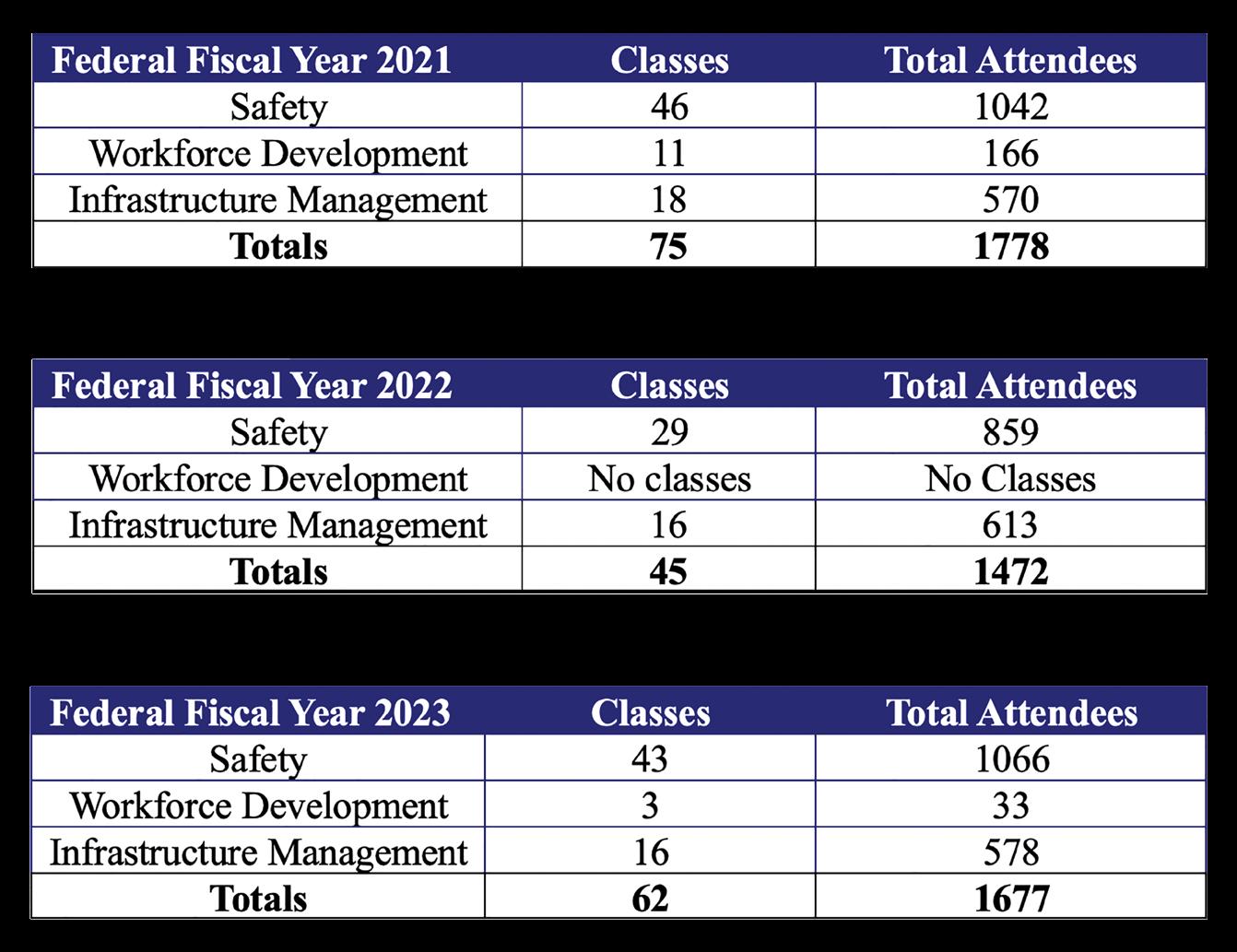
Conclusion
The primary focus of LTAP is providing informational resources to the local agencies at the request of those local agencies. The resources are listed online in categories and under these categories are the classes available to the agencies. The agencies can select the course they are interested in for their specific need. The categories are Infrastructure Management, Safety, and Workforce Development. Employees can use the following link to view and request classes: https://
We hope our readers now have a greater understanding and appreciation of the valuable programs ARDOT administers in connection with local governments. Our county roads and city streets have greatly benefited over the years from the funding, training, and efficient administration by ARDOT. It is evident that many of our roads and bridges are in better physical condition and made safer by these important programs. ARDOT and local governments have developed a valuable partnership over the years that delivers significant dividends for Arkansans.
AAC RESEARCH CORNER
www.arcounties.org COUNTY LINES, WINTER 2024 17
Leave a rich legacy
Remember when you would go to bed at night as a kid thinking, “I can’t wait until I wake up.”
Oh, for the attitude of a 5-year-old. That simple uncluttered desire for living that can’t wait for tomorrow. I not only remember that feeling as a kid, but that same feeling has prevailed through most of my professional career. It has been fun to get up in the mornings and go to work. I have truly had a blessed life. When I got into county government almost 45 years ago, I found my calling. I was where I belonged.
Are you in the right place? Public service is not just a job for a paycheck. If you have been elected to a county office and are doing it for any other reason than public service, then you are in the wrong place. Many of you are only in your second year of your first term. If you have not given it much thought up until now, it’s time to think about it and realize that you are in a position of public service. Public service is an honor, and it deserves your commitment.
I’m going to spend my time in this issue of County Lines talking about leading, legacy and life.
Leading
County officials should choose to lead in these difficult times.
“It was the best of times, it was the worst of times, it was the age of wisdom, it was the age of foolishness…”
It seems like Charles Dickens was writing about our nation’s current fiscal and political calamities when he penned those words in 1859. We are not living in an era like the one described in Dickens’ A Tale of Two Cities, but we are certainly amid great economic and political struggles. These tough times should bring out the best attributes of a true public servant.
During my long tenure as an elected county official, during my years as executive director of the Association of Arkansas Counties (AAC), and during the last 13 plus years serving as a consultant to the AAC, tough times have really challenged me and made me focus to find solutions.
Today’s political and economic climate calls for leaders who can develop a vision to prepare our counties for the future. We need leaders who can look down the road and discern what is important to future generations, and then articulate that vision to a public that naturally does not like taxes — even though it takes money to provide the government services they want and need. The current rhetoric about taxes fails to recognize that most of the taxes we pay today at the local and state levels are an investment in our future. And many local taxes will be passed by the electorate with a well-laid plan and trusted leadership. Trusted leadership comes with always being open and honest with your constit-
uency — not telling them what they want to hear but telling the simple truth.
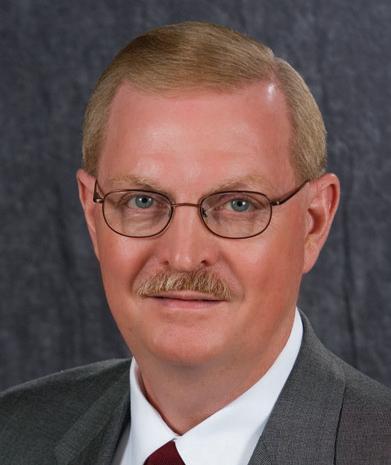
Trusted leadership is leadership that keeps the county prepared to be resilient in the tough times and prepared to flourish in the good times. County government leaders who focus only on trying to make everyone feel better today will continue to suffer because they won’t have the infrastructure or the plan in place to succeed. There will always be Red Seas, Jericho Walls, and Goliaths to conquer, but strong county leaders do it. The key to success is more about passion than talent; it’s more about reaching potential than being gifted. Eleanor Roosevelt said, “We must do the things we think we cannot do.”
County leaders don’t always get to choose the battle or issue, but you do get to choose how you will respond. In the best of times or the worst of times, people need someone to shoulder the task and lead the way. Maintain the focus. Make the choice. Don’t put it off. Be the leader you were elected to be.
Legacy
County officials should start their service thinking about the leadership legacy they will leave. Thinking about your legacy will prove to be the impetus for your service and keep you on track. I can remember from the beginning of my service over four decades ago that I simply wanted to “make a difference.” I soon realized that “make a difference” needed further definition. How would I make a difference? Musing upon that question was revealing. To make a difference, I wanted to be an elected official seen as a high-standard example of ethics, strong work habits, knowledge of county government law, accuracy of facts and figures, and fairness. My hope is that Arkansas county government is better for my having passed its way. Was I successful? That’s not my call, but it kept me focused to be the best I could be.
In “Leaving a Leadership Legacy,” Dr. Randy Garner said, “Regardless of what you do as a leader, you will leave a legacy — the important thing is to consider how you would like to be remembered and to work toward those things that ensure the realization of that vision. When you think of your legacy now, it is much more likely that the legacy you actually leave will better match your goal. Legacy leadership is not accidental; it is intentional. It begins with self-reflection on how you see yourself, your role, and the way you want to influence others. Perhaps it might be more appropriate to talk about living your legacy rather than leaving a legacy, since the real
AAC SEEMS TO ME...
18 COUNTY LINES, WINTER 2024
Eddie A. Jones County Consultant
challenge is to daily lead our lives in a way that positively influences those around us.”
Think back to the men and women who have shaped and mentored you. They planted seeds in your mind and heart — seeds of faith, hope and love; seeds of enthusiasm, action and service. They invested in your today so that you might pass on a legacy for someone else’s tomorrow. What lasting things will you plant today? What legacy will you leave? Thinking today about the legacy you are leaving for others tomorrow will make you a better county leader today. Building a legacy worth leaving begins today and is made one decision at a time. Make a difference.
Life
Insight into the meaning of life has been a central preoccupation of literature from ancient times. Numerous philosophies and religions have touted the “meaning of life” — not all in the same way by any stretch of the imagination.
For most of us, we regard life as a precious gift from God — precious not only because it is a gift from God, but also because as humans there is a uniqueness attached to that gift. We are created in the image of God. Because we carry within us the divine image, we have unlimited potential. We know that it is God “in whom we live and move and have our being.”
One of life’s greatest challenges is to find your true purpose in life. That covers a lot of territory, but for the purpose at hand, I’m talking about your purpose in life vocationally. Confucius, a Chinese teacher, politician, and philosopher, said many years ago, “Choose work that you love and you’ll never have to work another day in your life.” I am so blessed to have spent almost 45 years in public service. Public service gives you the opportunity to be what you are, and to become what you are capable of becoming.
If you are currently serving in county government, maybe it is because you have found your true vocational purpose in life like I did many years ago. I truly hope so. Our people need dedicated men and women serving them in the realm of county government — no doubt the closest and most responsive government to the people. Dedication to the task calls for a lot of hard work and sacrifice.
Arnold Schwarzenegger said, “Help others and give something back. I guarantee you will discover that while public
service improves the lives and the world around you, its greatest reward is the enrichment and new meaning it will bring your own life.”
Margaret Chase Smith, a Republican who served the state of Maine both as a U.S. Representative and as a Senator said, “Public service must be more than doing a job efficiently and honestly. It must be a complete dedication to the people.” That requires total dedication and attention to detail and work.
When I say work, I mean work. Don’t be a public servant that allows the old public servant joke have real meaning. Oh, you haven’t heard it? Well, allow me to tell you. It goes like this: “Why doesn’t a public servant look out the window in the morning? … Because then they won’t have anything to do in the afternoon.”
When I first ran for public office, it was with the passion and idealism of a young 25-year-old man who believed government could help make our lives better; that public service was a calling; and that citizenship in this great country demanded responsibilities. There was a greater good. Be dedicated, responsive and timely in your public service.
And if you don’t care about tiny details, you’ll produce bad work because good work is the culmination of hundreds of tiny details. The world’s most successful people all sweat the small stuff.
The simple uncluttered desire for living that can’t wait for tomorrow — that’s the attitude we should all take in our life of public service in county government. Donald Rumsfeld said, “Enjoy your time in public service. It may well be one of the most interesting and challenging times of your life.”
Your public service career should be marked by being:
• Authentic and transparent;
• Proactive and responsive;
• Consistent and adaptable;
• Empathetic and respectful; and
• Innovative and creative.
Live a dedicated life of service providing true leadership and thereby leaving a rich legacy, a blessed life, and a rewarding career. They go together just like fried taters, pinto beans, hog jowl, sliced onions and cornbread on a cold winter day. Oh, and collard greens.
We want your news

Did an aspect of county government “make news” recently in your county? Did any of your county officials or staff get an award, appointment or pat on the back? Please let us know about it for the next edition of County Lines magazine. You can write up a couple of paragraphs about it, or if something ran in your local paper, call and ask them to forward the story to us. We encourage you or your newspaper to attach a good quality photo, too: e-mail csmith@arcounties.org.
SEEMS
AAC
TO ME...
COUNTY LINES, WINTER 2024 19
Navigating FOIA requests: You have to start somewhere
County elected officials are getting more Freedom of Information Act (FOIA) requests than ever before. Many of these are legitimate requests from Arkansas citizens or businesses, exercising their rights to access government transparency, and should be addressed with the prompt attention they deserve. With the sheer number of FOIA requests inundating local governments, I hope your office is fortunate enough to have the resources to hire someone to focus their attention on citizen requests for public records. However, having worked with county officials for nearly 12 years now, I know this is not the case in most offices. Fortunately, many of these requests can be filtered out by a few gatekeeping measures, allowing you to focus on legitimate requests from Arkansas citizens.
Arkansas FOIA is for Arkansas citizens
Arkansas Code § 25-19-105(a)(1)(A) states, “public records shall be open to inspection and copying ... by any citizen of the State of Arkansas during the regular business hours of the custodian of the records.” Case law has interpreted “citizen” to include corporations authorized to do business in Arkansas. The first thing you should look at when you receive a FOIA request is who the requester is. If it is an individual that resides out of state, you generally do not have to fulfill the request. The same goes for corporations outside of Arkansas.
to see if they are registered and in good standing to do business in the state of Arkansas. If so, I would generally consider the corporation eligible to make a request under Arkansas FOIA.
Arkansas FOIA is for requesting public records
 General Counsel
General Counsel
The first thing you should look at when you receive a FOIA request is who the requester is.
If it is an individual that resides out of state, you generally do not have to fulfill the request. The same goes for corporations outside of Arkansas.
Once you have determined the request is from an Arkansas citizen, as defined for Arkansas FOIA purposes, you should look to the actual substance of the request. As previously mentioned, § 25-19-105(a)(1)(A) provides, “public records shall be open to inspection and copying ....” “Public records” is broadly defined within the FOIA to include almost any document, writing, recording, etc. kept in a public office. There are a myriad of exceptions that I won’t touch on in this article, as well as personal records that do not relate to the “performance or lack of performance of official functions” or are not “within the scope of their employment” that are not subject to FOIA requests.
For individuals, I believe you are within your rights to ask someone for their Arkansas address of residence before fulfilling their request. Many requests will come with only an email address or a phone number that has an out of state area code. The only way to verify they are an Arkansas citizen is to ask them for some kind of proof of their Arkansas address. Some county attorneys advise county officials to request a driver’s license, utility bill, or other proof of Arkansas residence.
For corporations, it is pretty simple. If they have an Arkansas address, they are entitled to make FOIA requests. If they are located outside of Arkansas, you can go to the Arkansas Secretary of State’s website and do a Business Entity Search
Most importantly, the FOIA guarantees Arkansas citizens the right to request public records, not information. FOIA requests that present mere questions or requests for information are not proper requests. Common instances of this are requests that ask for legal advice, technical assistance, your opinion on a matter, etc. It doesn’t matter the substance of the request, if the request is asking you for an opinion or information that is not found in a public record kept in your office, you do not have to fulfill the request.
Custodians must only provide records they possess
At this point, you have determined that the request is from an Arkansas citizen and that it is for a public record. § 25-19103(7)(A) defines a public record as one that is “required by law to be kept or otherwise kept ....” There are laws about the
AAC LEGAL CORNER
See “FOIA” on Page 46 >>>
LINDSEY FRENCH
20 COUNTY LINES, WINTER 2024
Preparing for the Great Solar Eclipse of 2024
If you are just now starting to plan for this event you are a little behind schedule. From Little River County to Randolph County, the sky will go dark around 1:45 p.m. on April 8. This will be a path of totality over 100 miles wide. The moon will be moving at a pace of about 1,850 mph; the sky will be dark for a little over 4 minutes; and Arkansas has been identified as one of the prime spots to watch the total solar eclipse. Such an event will not happen again until 2044. I did not understand the buzz about it until I attended our 2023 annual AAC conference. One of our breakout sessions was “Preparing for the 2024 Solar Eclipse.” I have been to many breakout sessions at our conference over the years, and this one was by far the best attended one I have been a part of.
The first speaker on the panel was Van Buren County Judge Dale James. Van Buren County has been preparing for the eclipse since 2017 when James, then a justice of the peace, went to Carbondale, Illinois, to study their preparation and response to the August 2017 total solar eclipse. Van Buren County then set up an Eclipse Committee that set criteria for events to be advertised on the county website.
“I went to Carbondale, Illinois, for the specific purpose of finding missed opportunities. The largest opportunity was in breakfast offerings the day of the eclipse. The drive-thru for McDonalds stretched for six blocks while other businesses were not open,” James said. “With the (2024) event falling shortly after lunchtime, eclipse enthusiasts will be looking to fill their bellies before they arrive at their venue. While they fill their bellies, they fill our wallets with tax revenue. We all need to make sure that we do not leave any opportunity on the table. We have one shot at seizing this opportunity, at least for many years to come.”
Conway County Judge Jimmy Hart has a prime spot to view the eclipse on Petit Jean Mountain. Conway County skies will be dark for over 4 minutes because they are right on the centerline of totality. The Conway County Quorum Court passed a temporary land use permit ordinance to provide guidelines for property owners. This permit allows for short-term activities or events to which the public may be invited, and which are conducted on private property. It talks about the landowner being responsible for sanitation, lighting, and making sure emergency vehicles have access to the sight. There will be a fee and a refundable deposit, with the expectation of the property being returned to pre-event condition. People want to be in the rural areas without lights so they can have the full experience of watching the eclipse.
Pope County Judge Ben Cross said his county and the city of Russellville have been working together for over a year to prepare for an influx of up to 120,000 visitors leading up to April 8.
“We have monthly meetings where every discipline of both public and private sector come together to plan for everything from emergency preparedness to food and lodging to public events being planned to help mitigate the mass exodus that
is expected to occur when the eclipse concludes,” Cross said. “We have reached out to three other communities where this has occurred previously for their emergency operations plans and lessons learned … We feel we have prepared exceptionally well and will perform in the most effective means possible, based on our working group that has devoted hundreds of hours to creating an overall roadmap of what is expected.”

Many astronomy magazines have depicted Russellville as the ninth best location in the country to view the event, and a team of NASA scientists and astronauts plan to broadcast live from downtown.
“We fully expect the buildup and hype around the event will become a reality … unless of course it rains. However, even in the event of cloud cover, we have learned the Little Rock Air Force Base will be providing NASA with a C-130 that will be orbiting overhead to relay in real time, the eclipse from above any cloud deck, so as you see, virtually every angle of this event is planned out,” Cross said.
The Arkansas Department of Emergency Management (ADEM) is a key stakeholder that counties rely on heavily. ADEM Director A.J. Gary said his department has been working with local, state, and federal agencies, as well as privatesector partners over the past year to prepare for the event.
“We are expecting an influx of visitors in Arkansas to experience the eclipse,” he said. The State Emergency Operations Center will be activated before, during, and after the eclipse to make sure we are ready to assist. We want our visitors to experience the great state of Arkansas and have a safe and enjoyable visit.”
ADEM has also announced the launch of a unique web portal (https://adem.maps.arcgis.com/apps/dashboards/faca5d03 c4de48349366779a6d072034) that will provide visitors with details on special eclipse events planned across the state.
The last speaker of our breakout session at conference was KNWA Meteorologist Dan Skoff, and he was super excited about the eclipse. He said it’s the most amazing thing to witness. He said he will travel to Ohio if Arkansas, Texas, and Missouri have cloud cover on April 8. Of course, he explained the science behind the eclipse and why it is so rare. Then he told us all the interesting things we would see during the eclipse. For instance, the corona — the Sun’s outer atmosphere — can only be seen during a total solar eclipse. The corona is made up of beautiful wispy, white streamers of plasma (charged gas)
AAC GOVERNMENTAL AFFAIRS
Josh Curtis Governmental Affairs Director
See “ECLIPSE” on Page 32 >>> COUNTY LINES, WINTER 2024 21
Combined single limit coverage will protect officials and employees who use county vehicles outside scope of duties
Ark. Code Ann. § 21-9-301 provides statutory negligence immunity to counties. In addition, the Arkansas Supreme Court has held that the immunity provided in Ark. Code Ann. § 21-9301 also applies to the officials and employees of the county. Doe v. Baum, 348 Ark. 259, 270; See Cousins v. Dennis, 298 Ark. 310 (1989). However, there is a limited exception to the tort immunity of counties and their employees, and that rests in automobile negligence and liability.
Arkansas law requires counties to carry minimum liability limits of $25,000 for injury or death of one person, $50,000 per accident if more than one person is injured, and $25,000 for property damage per accident. Ark. Code Ann. § 21-9303(a). The county and its officials and employees are not immune to the extent they have insurance coverage. Thus, if a county carries the minimum liability limits, they are immune from suit above and beyond those limits. Similarly, if a county elects to purchase additional coverage, their immunity exists above and beyond those higher limits.
This means that counties, county officials, and county employees are statutorily immune from motor vehicle negligence liability exceeding $25,000 bodily injury per person, $50,000 bodily injury per accident, and $25,000 property damage per accident, unless waived by the purchase of additional coverage.
However, there is a stipulation to when county officials and county employees are protected by these immunities: at the time of the accident the official or employee must have been working in the course and scope of their county employment. Carlew v. Wright, 356 Ark. 208, 216 (2004), See Cousins v. Dennis, 298 Ark. 310 (1989).
If an official or employee uses a county vehicle at a time other than when they are working on official county business, they are potentially exposed to additional liability over and above the auto protection coverage provided by the county’s insurer or self-insurance risk pool. For example: A county official/employee takes their vehicle home every night, and on the way home they stop to pick up dinner. When leaving the restaurant parking lot, they cause an accident, which results in a lawsuit against them. Since the official/employee was not operating the vehicle within the scope and course of their employment at the time of the accident, they are not protected by the statutory immunity normally afforded to a county and its officials and employees.
If judgment is rendered against the official/employee

in excess of the policy limits on the vehicle, most likely the state minimum limits of $25,000/$50,000/$25,000, as discussed above, then the official would be responsible for payment of the excess judgment. Using our example, if the plaintiff was awarded judgment against the official/employee in the amount of $60,000 for bodily injury of one person, and the applicable protection limits were $25,000, the county official/employee would be responsible for payment of the excess judgment of $35,000.
Additionally, if an official or employee uses a county vehicle while they are working, but they use the vehicle for a non-work-related purpose, there is also potential liability exposure. For example: A county employee is at work and driving a county vehicle, but they decide to drive to Walmart on their lunch break in the county vehicle, or run several errands, and in the process, they cause an accident. The accident results in a lawsuit, and judgment is rendered against the employee for $55,000 for bodily injury of one person. Even though the accident occurred during the county employee’s workday, the fact that they were driving to take care of personal business can put them outside of the course and scope of their employment for tort immunity purposes. This means the county employee would be liable for the amount of the judgment in excess of any available coverage amount. If the coverage agreement would pay $25,000, then the employee would be personally responsible for the difference of $30,000.
The best way to ensure that county employees and officials who drive county owned and insured vehicles outside of the course and scope of their employment duties are adequately protected is for each driver to check with their own personal auto insurance carrier and find out if their policy provides secondary coverage for them when they are driving the county owned vehicle. In addition to checking with the county official/employee’s personal auto insurance carrier, the AAC Risk Management Fund also offers alternative coverage to the standard protection of $25,0000/$50,000/$25,0000 state minimum limits coverage, which is a combined single limit of $100,000. With combined single limit coverage, there is up to $100,000 available to cover bodily injury claims and/or property damage claims combined per occurrence.
AAC RISK MANAGEMENT SERVICES
Melissa Dugger RMS Litigation Counsel
22 COUNTY LINES, WINTER 2024
On uniformity, fairness and taxes
Greetings, faithful county officials and friends of county government. I’m grateful that my primary job duty is to represent the counties’ interests in the judicial branch of government. I’m mostly ignorant and unaccomplished about most things, but I have achieved at least basic proficiency at lawyering in and around the judiciary. I truly enjoy it, and I’m honored to do it on behalf of counties and county officials in Arkansas. The following is an essay inspired by this work that I am blessed to do, including several cases in which I represent many of you.
Two years ago, I dedicated a column to Kimbrough v. Grieve, a statewide class action about Amendment 79 to the Arkansas Constitution and the freeze of the assessed value of a homestead — and resulting freeze of property tax liability — provided by Amendment 79 for Arkansans who become disabled or reach age 65. The plaintiffs in Kimbrough argue that the Amendment 79 freeze should transfer from owner-to-owner when homesteads are sold, that the freeze of assessed value under Amendment 79 is transferable. In this case, I represent all 75 Arkansas counties, and the county judges, county assessors, county collectors, and county treasurers of each county, as defendants in the case. On your behalf, we have defended the constitutionality and validity of multiple Arkansas laws providing that the freeze of assessed value is not transferable; when an eligible citizen purchases a homestead, they may obtain a freeze of the assessed value of the home at the time of purchase and for as long as they own the home, but they may not transfer a freeze obtained in the past by the seller. The property is always assessed at full value upon sale (as with all properties), and if the buyer is eligible for an Amendment 79 freeze, the buyer may obtain a freeze of that assessed value moving forward.
After a great deal of briefing in the case, the trial court — appointed Special Judge Gary Arnold — concluded that the court lacked jurisdiction because the plaintiffs failed to exhaust their administrative remedies by challenging their property assessment before the equalization board and county court before bringing their case to circuit court. But Judge Arnold also concluded that if he had jurisdiction, he would declare the statutes unconstitutional and order the counties to refund several years of tax payments by owners of applicable properties across the state, giving them the benefit of freezes obtained by prior owners of their properties. The case is now on appeal by the plaintiffs (and cross-appeal by the counties) before the Arkansas Supreme Court (Case No. CV-23-326). Briefing is complete, and the Supreme Court will rule soon.
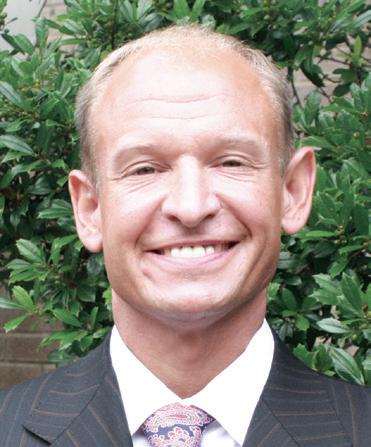
There are several reasons why the statutes challenged in Kimbrough are constitutional, and why it makes sense to assess all property at full value upon sale in all circumstances — even where the seller and buyer both qualify for a freeze of assessed value under Amendment 79. One reason is the basic notion of uniformity and fairness in tax law and tax administration. Amendment 79 provides a tax benefit for a specified class of Arkansas citizens — those who are disabled or over age 65. Arkansas voters made this policy choice, and put it in the constitution, so there is no doubt that these classes of Arkansans receive the tax benefit. Amendment 79 discriminates —constitutionally — in favor of the elderly and disabled. But Amendment 79 should not be interpreted to create subclasses and provide greater and lesser benefits to subclasses of the elderly and disabled for no good reason. Under the Kimbrough plaintiffs’ interpretation, an Amendment 79 qualifying Arkansan who purchases a home from a seller who obtained a freeze in the past receives a greater benefit than an Amendment 79 qualifying buyer who purchases the same home from a seller who did not obtain a freeze in the past — yet there is no valid reason for this discrimination among Arkansans who should be treated equally under Amendment 79 (and all laws). In other words, the plaintiffs’ interpretation is not uniform, and not fair. The governments’ interpretation, and the statutes adopted by the legislature, are uniform and fair — all Amendment 79 qualifying Arkansans are treated equally.
In Morrilton Housing Partners v. Conway County, a taxpayer has challenged the assessment on their property, which is a low-income housing project recognized as an LIHTC property under the Internal Revenue Code — the rent the taxpayer may charge on the property is restricted, and the taxpayer receives a federal subsidy each year. A mass appraiser working on behalf of the assessor used the comparative sales approach to calculate the fair market value of the property — a recognized assessment methodology that can be used to ensure fairness and uniformity in determining the market value of property. The taxpayer argues the property value should be determined using an income-based approach, and according to the taxpayer, the restricted rent should be included in the calculation of market value using an income approach, but
AAC LITIGATION LESSONS
See “UNIFORMITY” on Page 24 >>> COUNTY LINES, WINTER 2024 23
Colin Jorgensen Litigation Counsel
the federal subsidy should not be considered income and should not be included in that calculation of market value under an income approach. Unsurprisingly, the taxpayer’s asserted market value of the property is substantially lower than the assessor’s calculation using the comparative sales approach, and the taxpayer claims to owe substantially less taxes as a result. In defense of its assessment, the county argues that the comparative sales approach used by the county is recognized as an approach that ensures uniformity and fairness in valuing properties, while there are no available and recognized guidelines for valuing a low-income/subsidized housing property using the income approach, as the taxpayer seeks to do in this case. Thus, the courts should affirm the value calculated by the assessor (and the resulting tax liability) using the same recognized methodology applied to other properties. This case is currently on appeal before the Conway County Circuit Court, with Special Judge John Goodson presiding.
Uniformity and fairness are important principles for all taxes, not just property taxes. In Hotels.com, L.P., et al v. Pine Bluff Advertising and Promotion Commission, et al, Arkansas counties, city commissions, and the state have united against online travel companies (OTCs such as Hotels.com, Travelocity, and Priceline), seeking payment of gross receipts taxes and tourism taxes the OTCs did not pay in Arkansas for many years. The case has a lengthy history; the original complaint was filed in 2009. Ultimately, the Jefferson County Circuit Court (Judge Robert H. Wyatt, Jr.) agreed with the governments’ argument that these non-Arkansas companies are subject to gross receipts taxes and tourism taxes when they furnish lodging in Arkansas just like Arkansas companies and brick-and-mortar businesses in Arkansas are subject to gross receipts taxes and tourism taxes when they furnish lodging in Arkansas. The trial court entered judgment against the online travel companies for over $30 million dollars, representing unpaid taxes and statutory penalties for failure to remit taxes owed.
Hotels.com is on its third (and hopefully final) appeal to the Arkansas Supreme Court. The AAC and Arkansas Municipal League recently joined forces to prepare and file an amicus brief in support of the counties and cities in the case — in support of uniform and fair application of local gross receipts taxes and tourism taxes across Arkansas. As noted in

the counties’ and cities’ proffered amicus brief: “The OTCs’ various arguments all require the Court to accept the notion that the legislature intended to provide a tax exemption to an out-of-state interest and to the detriment of Arkansas citizens, Arkansas state and local governments, and Arkansas businesses that provide accommodations to transient guests ... If this Court accepted the OTCs’ interpretation, then the OTCs could avoid tax liability simply by defining their transactions as lying outside the scope of the tax laws, and ignoring the fact that as a functional matter, the transactions are squarely within the scope of the tax laws.” In other words, the relevant tax laws apply equally to the OTCs just as they apply to other businesses providing the same services and conducting the same transactions in Arkansas.
If you don’t perceive a common thread among Kimbrough, Morrilton Housing Partners, and Hotels.com, then I’ve done a poor job preaching to you about fairness and uniformity. Fairness and uniformity — a/k/a equal protection under the law, even when you are being taxed — is the principle undergirding these cases, and scores of similar cases, since the marriage of taxation and equal protection in America and Arkansas. The law is replete with provisions requiring uniformity and fairness in the administration of taxation. For example, uniformity and fairness is enshrined in Article 16, § 5 of the Arkansas Constitution regarding the ad valorem property tax administered by counties: “All property subject to taxation shall be taxed according to its value, that value to be ascertained in such a manner as the general assembly shall direct, making the same equal and uniform throughout the state.” (Emphases added).
You may like taxes or hate taxes, or you may begrudgingly acknowledge the necessity of taxation without emotion.
You may think taxes are too high, or too low, or exactly right.
You may be rich or poor, or neither rich nor poor.
But regardless of your financial and demographic and political circumstances, you should agree that taxation should be uniform and fair.
Citizens with identical relevant circumstances should be subject to identical relevant taxes. Citizens who enjoy tax exemptions should enjoy them equally. No citizen should be arbitrarily taxed more, or less, than another citizen with the same circumstances.
AAC LITIGATION LESSONS
<<< Follow us on Facebook @75ARcounties for the latest county news. 24 COUNTY LINES, WINTER 2024
UNIFORMITY Continued From Page 23
Saving for retirement made easier
The 457(b) deferred comp plan
When you join your employer’s 457(b) deferred compensation (comp) plan, you get a wealth of online resources to help you set your goals, research investment options and decide how much to save for retirement.
But you also get attentive service from Nationwide® Retirement Specialists. We’ll take time to understand your situation so we can provide personalized guidance as you:
Identify your retirement goals
Enroll in your employer’s retirement plan
Determine your contribution level
Develop a personalized long-term investment strategy
Keep track of your plan over time
What matters is where you want to go and how you’re going to get there. Let us help.
This material is not a recommendation to buy or sell a financial product or to adopt an investment strategy. Investors should discuss their specific situation with their financial professional.



Have questions? Your Nationwide Retirement Specialists are here to help.
Jillian Russell 405-642-5387 russj15@nationwide.com
Retirement Resource Group 888-401-5272 nrsforu@nationwide.com
To schedule an individual appointment, scan this code.
NRM-17501AO.1
(07/21)
Nationwide Retirement Solutions and Nationwide Life Insurance Company (collectively "Nationwide") have endorsement relationships with the National Association of Counties, the International Association of Fire-Fighters Corporation, the United States Conference of Mayors and the National Association of Police Organizations. Information provided by Retirement Specialists is for educational purposes only and not intended as investment advice. Nationwide Retirement Specialists and plan representatives are Registered Representatives of Nationwide Investment Services Corporation, member FINRA, Columbus, Ohio. Nationwide and the Nationwide N and Eagle are service marks of Nationwide Mutual Insurance Company. ©2022 Nationwide


A Year in Review
New elected officials reflect on first year in office
Story by Sarah Perry AAC Communications Coordinator
In 2016, voters approved a constitutional amendment to grant county elected officials four-year terms. For many, it was a welcome relief from the seemingly endless cycle of campaigning. However, it also caused record-breaking turnover last year. January 2023 saw many new faces in county government. While some have worked in county government for years, others were new to it.
A year later, we visited with some of the new officials to find out about some of the challenges and triumphs they have experienced.
Madison County experienced the biggest turnover in the 2022 election, with eight new county officials and eight new justices of the peace.
“We have a whole new courthouse,” Madison County Treasurer Carmen Watkins joked.
She said the new people have asked previous officials plenty of questions and the former county clerk stayed for some time to help during the transition.
Watkins had previously worked for a municipality and decided to run for the treasurer position because of her love
for accounting. Since taking office, she has worked to update her offices’ processes. Based on presentations made at the Arkansas County Treasurers’ Association continuing education meetings, her office has also started completing tasks they previously were not tackling. Since she and the county clerk often work together, she had to learn how job duties are split between the two offices.
Cross County Collector Kristy Davis and Phillips County Clerk Shakira Winfield both took over in their respective offices from a family member. Davis’ mother-in-law, Debbie Davis, previously served as the collector, and Winfield worked under her mother, Linda White-Winfield, for 10 years before stepping into the role of county clerk. Having worked in the office for a decade, Winfield said she thought she had a good understanding of everything the county clerk’s office handles day to day. After taking office, she was surprised by how much her mother did without her knowledge.
“I think the first week, I called her every day, all day,” Winfield said with a laugh.
She struggled most with making sure she receives various paperwork on time.
“Coming behind Ms. Linda, those were big shoes to fill, and I know I could never fill those shoes.” Winfield said. “I
Above left: Independence County Judge Kevin Jeffery said he ran for the office to make a difference in his community. Above right: Faulkner County Circuit Clerk Nancy Eastham (right) said she has benefited from the friendships she has made in her association.
AAC FEATURE
26 COUNTY LINES, WINTER 2024
think I have done well walking in my own shoes for the first year.”
Having survived her first year in office, she is now working to make sure the 2024 election runs smoothly.
Davis, who had previously worked in the private sector, trained under her mother-in-law for months before taking office. In her first year, Davis said she was surprised to learn how uneducated the community is about county taxes. She has since changed her marketing materials and how she approaches customers.
Like Davis, Johnson County Assessor Rusty Hardgrave said he wants to better educate his community this year after learning how many people were not aware about the requirement to assess property and the homestead tax credit. Hardgrave also came from the private sector with experience working in real estate and retail sales. After being appointed assessor, he has leaned on his experienced staff, and he has learned that county government involves many decision makers.
“I was so used to being the broker or being the manager at places where I made the only decisions,” he said. “Here you deal with the quorum court, you deal with other elected officials, maybe you deal with some regulation through other people.”
Unlike Hardgrave, Chicot County Collector Jolecia Manning had worked in county government for eight years before running for office. While the previous collector had trained her for the position before retiring, Manning said that running for office forced her to come out of her shell. At training for newly elected officials in 2022, Manning met two other new collectors. They have been friends ever since, and they always reconnect at association meetings.
Faulkner County Circuit Clerk Nancy Eastham said she also built some great friendships with people she met in
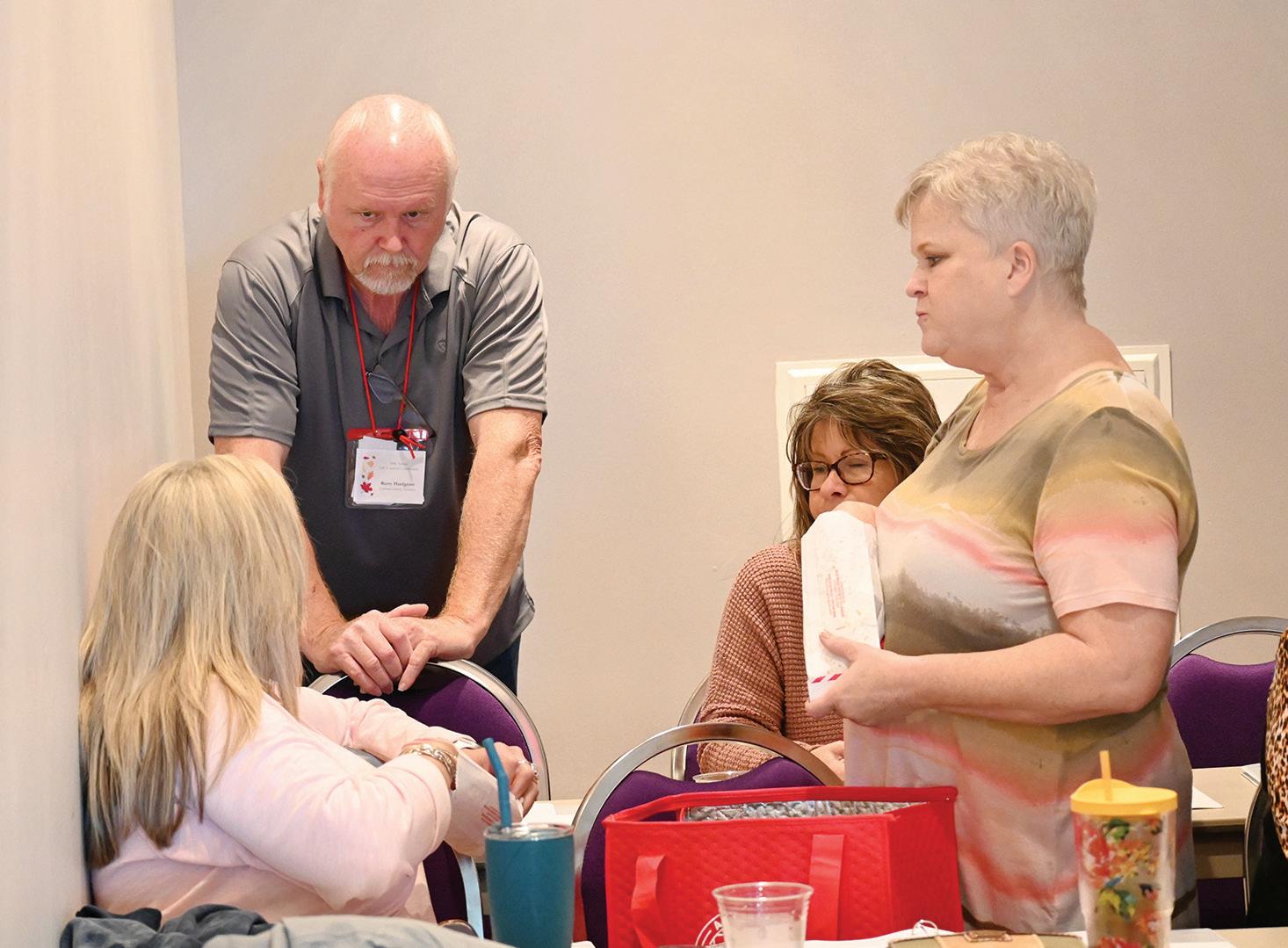

AAC FEATURE
Top: Johnson County Assessor Rusty Hardgrave, pictured here speaking to colleagues at an association meeting, came from the private sector. He said he wants to better educate his community on assessing property and the homestead tax credit.
See “REVIEW” on Page 28 >>> COUNTY LINES, WINTER 2024 27
Bottom: Phillips County Collector Shakira Winfield (left) worked for her mother, former Phillips County Collector Linda White-Winfield, for 10 years before running for the office. She said when she took office, she was surprised by the number of tasks her mother completed without her knowledge.
REVIEW
her association. She has a group text message thread with two other new circuit clerks and has sent messages to more experienced clerks if she has questions. After working in county government since 1995, Eastham said she had struggled transitioning to being a supervisor.
“It’s been a big adjustment. I’ve answered to someone for 28 years and now the voters are the only people that I answer to,” she said.
Like Eastham, some other elected officials said they also struggled with the transition to a supervisory role.
Scott County/Circuit Clerk Tracy McPherson said she had to work out some kinks as her co-workers learned her expectations and learned each other’s personalities. She said she prays that she is building a strong, solid team in her office that can continue even if she is not re-elected.
After working in the circuit clerk’s office since 2019, McPherson was encouraged to run by the previous clerk and other co-workers. She did not quite know what to expect when taking office in 2023 and every day she had to tackle something new. While her first year as clerk was difficult, she said this year is starting much better.
St. Francis County Assessor Ginadell Adams said she has struggled with the transition of being a supervisor compared to being an employee. While she works with a great team, after working in the assessor’s office since 1990, she has had to learn how to delegate tasks and train others to take on some of her former tasks.
While thinking back on her first year in office, she summed it up this way: “Learn every day.”
Craighead County Clerk Mary Dawn Marshall expressed similar sentiments.
“There is always something to learn. There is always something new. You can’t let it overwhelm you. You just have to buckle down and figure it out,” she said.
Her biggest challenge has been keeping up with various changes and making sure everyone has the same information, so they can do their jobs well. Her association helps her keep up to date, she said.
Desha County Coroner Jamie Evans ran for her position after moving to the state from Alabama in 2020. As a physician, she wanted to care for people at all stages.
“I want to be that small town doctor that is relied upon for everything. If it has to do with medical and it has to do with life and death and how we keep people well or how we explain what happened, that is who I want to be,” she said.
She also has a passion for helping people affected by the
Continued From Page 27 <<<
opioid epidemic. She has worked to make sure that opioidrelated deaths in her county are reported correctly and that she is there to support families. Helping others through these situations has also helped her talk to her patients in hopes of preventing more deaths.
“I hope for at least one, it has been impactful,” she said.
In her first year, she has also built connections with the community and law enforcement agencies.
Fellow coroner, Kelly Rowland who serves Miller County, has also worked to build connections with community agencies, county offices, law enforcement, hospice agencies, and funeral homes. She hopes to continue to do so along with educating the community and other elected officials about her office.
“To let people know that we are really here to serve the citizens of Miller County. That’s our function. We’re not a funeral home. We’re not law enforcement. We have a very different role, but it all fits into the same picture with everybody else,” she said.
Rowland, who ran for the coroner’s seat after serving as a deputy coroner since 2019, now works alongside nine deputy coroners.
While Independence County Judge Kevin Jeffery was new to county government, he is friends with the former county judge, so he knew some of what his job would entail. He was surprised by the complexity and diversity of the county judge’s office, he said. Jeffery ran for his position following a 36-year career in industry. After working for decades at a chemical company where things are rapidly changing, Jeffery has had to learn to have some patience.
“County government moves a little slower than I’m used to operating. You have to have patience to let processes take place and gather information before you make a decision,” he said.
Jeffery decided to start working in county government to make a difference in his community. In his first year in office, he has been taking on a lot of projects, but he said he is most proud of a $3 million senior center project. At this center, individuals will be able to enjoy their time and have access to services, including an expanded Meals on Wheels program.
Saline County Justice of the Peace CJ Engel did not really know what to expect when he joined the Quorum Court, but he has enjoyed “giving back to the community that raised me.” He originally did not have the idea of serving on the court. That changed after he worked as the director of emergency management for the county, and then moved on to a different job opportunity at the state level. After working
AAC FEATURE
28 COUNTY LINES, WINTER 2024
in public safety, he started paying attention to public safety issues and decided he wanted to get involved in his community “to support those that work every day for our county.”
Reflecting on his first year in office, Engel said his biggest accomplishment is that the court voted to classify dispatchers as first responders. Saline County is the first and only county in the state to do so, Engel said. Looking to the future, Engel wants to ensure the county has an environment that attracts growth while also keeping up with the demand on infrastructure because of that growth.
Sebastian County Judge Steve Hotz was extremely familiar with county government and many of the county employees because he previously worked as an appointed treasurer/collector and worked in the Sebastian County’s human resources department. Hotz said he was surprised by the number of phone calls he received in his first year as judge from the community with requests. He had received calls while working as the treasurer/collector, but not to the same extent that he does now. He thinks a majority of these calls were from people who had made some requests in the past.
“They were trying the new kid on the block to see if they could get it this time,” he said.
Washington County Sheriff Jay Cantrell started his career in law enforcement at the Washington County Sheriff’s Office when he was 21 years old. For 18 years, Cantrell worked as chief deputy under former Sheriff Tim Helder. Having worked at the sheriff’s office for so long, Cantrell knew how the office worked behind the scenes, but after being elected, he had to learn how to be the face of the office and the person that people look to. He explained it this way: “Going from the work horse behind the scenes to the show horse out in the front of the organization.”
Along with working to protect his community, Cantrell said this year he is working to bring back some programs at the Washington County Jail that were previously suspended because of COVID-19.
Like Cantrell, Greene County Sheriff Brad Snyder has had a long career in law enforcement, which began when he was a dispatcher at 19 years old. He worked for the Greene County Sheriff’s Office for three years before he was transferred to the Paragould Police Department. He worked there until he was elected sheriff. Snyder said he also wanted to serve as sheriff and felt the timing was right to run.
With the majority of his law enforcement experience coming from his time working for a city police department, Snyder has had to learn the differences between how municipalities and county governments operate, including processes and finances. He also had a lot to learn when it came to running a county jail.
“You’re running a small city: food service, medical, housing, the whole nine yards,” he said. “That has taken quite a bit to get accustomed to.”
Fortunately, he was able to lean on his fellow sheriffs for help.
“It’s like drinking water out of a fire hydrant, but I have loved every second of it,” he said.
No matter how their first year in office went, the elected officials interviewed for this article agreed on one thing: their respective associations and other more experienced elected officials provided tremendous support and assistance.
“There is not a week that goes by that I don’t rely on what we call our seasoned clerks for advice, for instruction … we all help each other,” Marshall said.
Snyder shared similar feelings. “We couldn’t do what we do without them.”

Craighead County Clerk Mary Dawn Marshall (center) said there is something new to learn every day and that she relies on her association to keep her informed of changes. She is pictured here with Pope County Clerk Pam Ennis
AAC FEATURE
COUNTY LINES, WINTER 2024 29
Left:
(left) and Craighead County Chief Deputy Clerk Carrie Martin (right) at an Arkansas Association of County Clerks meeting.
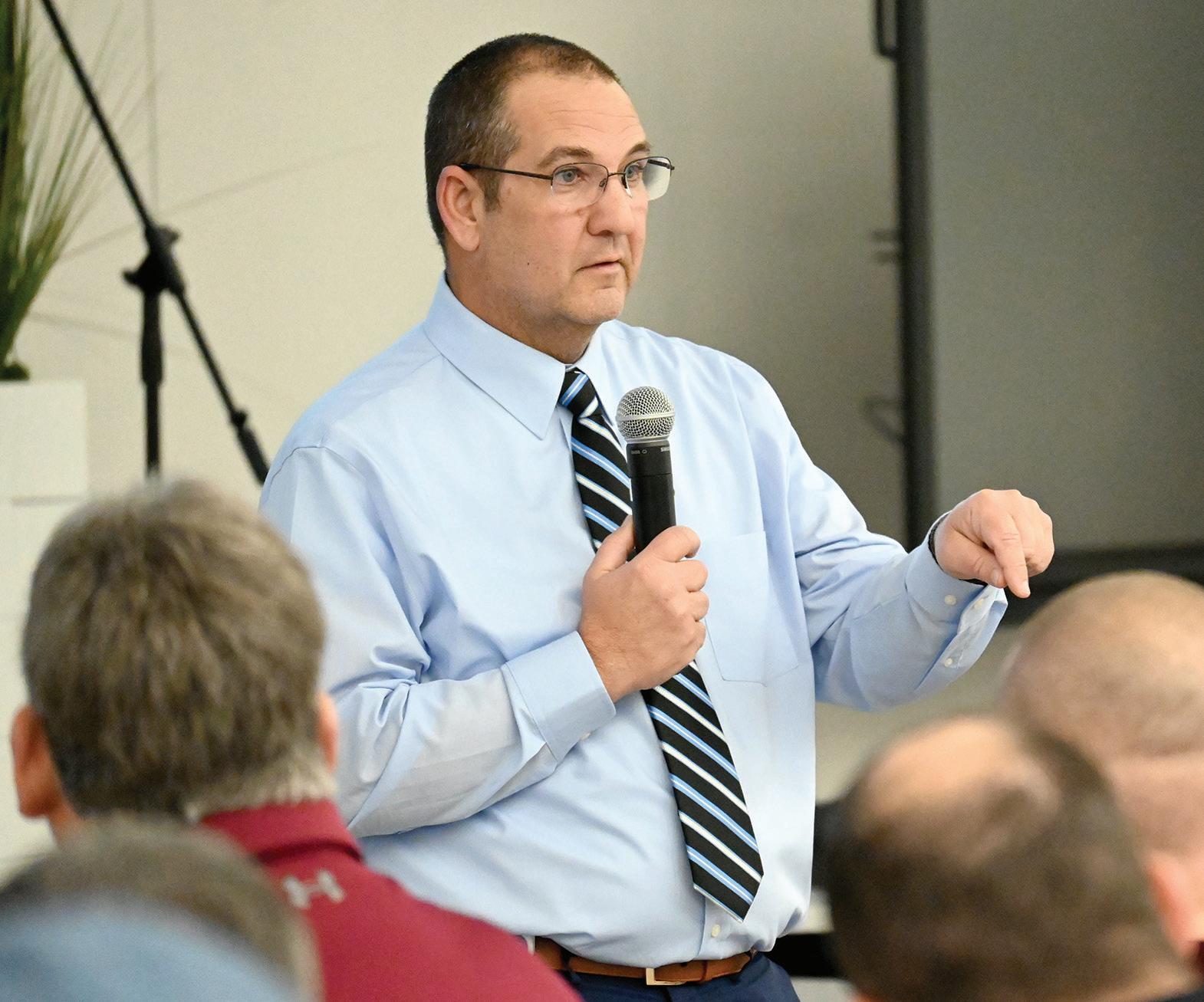
Paul Burnett, director of the Arkansas Law Enforcement Assistance Program, tells his story to attendees at a recent suicide prevention training hosted by the Arkansas Law Enforcement Training Academy at the Saline County Career Technical Campus. Burnett explained that after years of working in law enforcement and the trauma of being on the scene when a fellow officer was struck by an impaired driver, he had plans of taking his own life. He became connected to a law enforcement assistance program in Virginia and started a similar program in Arkansas.
Caring for mental health a top priority among sheriffs’ offices
First responders for many years were told that emotions do not belong in the workplace. If they tried to talk about their feelings after responding to difficult calls, they were told that they need to “suck it up” or find another job if they could not handle it.
“You just didn’t talk about those things. We went through critical incident after critical incident and that could be anything from really bad car wrecks to baby deaths. I can’t tell you how many people I saw shot and killed especially during the late 1990s-early 2000s in bad neighborhoods. We didn’t talk about it. We made jokes about it, and we drank at the lodge, but we didn’t talk about it,” said Capt. Jen Hillman of the Faulkner County Sheriff’s Office (FCSO).
In recent years, there has been a shift among first responders as they realize it is OK to ask for help.
Washington County Sheriff Jay Cantrell, who took office in 2023, said his staff’s mental health is one of his top priorities.
“Law enforcement deal with a lot of trauma, a lot of stressors, a lot of things that maybe the human brain wasn’t really designed to deal with,” he said. “We’ve gotten smarter and more knowledgeable about how the human body and the brain reacts to these stressors and thank goodness we have. We realize now that these things are important.”
Arkansas Sheriffs Association Executive Director Scott Bradley said he is proud there is not a stigma like there used to be and he is happy with the progress sheriffs’ offices across the state have taken to try to “better take care of our people.”
Since the association is responsible for looking out for sheriffs’ best interests regarding legislation, Bradley said he supports measures that can help deputies and their mental health. He wants to ensure deputies receive the support they need, while still protecting confidentialty.
First responders’ mental health is not just a talking point in Arkansas. In 2018, Congress enacted the Law Enforcement Mental Health and Wellness Act to study programs across the country designed primarily to address officer psychological health and wellbeing. It was found that first responders’ mental health can affect the entire department.
“Failing to address the mental health and wellness of officers can ultimately undermine community support for law enforcement and result in officers being less safe on the job,” according to the report.
Hillman, who developed the FCSO’s wellness policy, said since prioritizing staff’s mental health, the department has seen improvements, including better retention rates.
In 2021, the department lost 75 percent of its patrol officers to turnover. Now, Hillman said, the Faulkner County Sheriff’s Office is one of the few agencies that is not excessively shorthanded.
“When people are doing better, they are better employees,
AAC FEATURE
30 COUNTY LINES, WINTER 2024
Story and Photo by Sarah Perry AAC Communications Coordinator
better spouses. They are better parents, better friends, and it just makes for a better work environment,” she said.
Hillman’s passion for mental health came from watching fellow first responders struggle throughout her career, such as when the FCSO had a hard three years from 2019 to 2021. Deputies responded to one critical incident after another, and they were also dealing with the COVID-19 pandemic.
“Everybody went home for a little bit (during the pandemic), and everything got real still. That’s a bad thing for first responders in general. When you stop working and you get still and things kind of get quiet, that’s when the demons come … when those memories start to come, things you don’t want to think about that you’ve just been pushing away,” she said. “It got to the point where people couldn’t fake it.”
According to the Centers for Disease Control (CDC) report about suicides among first responders, these professionals are at an elevated risk for suicide because of the environment they work in day in and out.
“Law enforcement officers and firefighters are more likely to die by suicide than in the line of duty,” according to the report. “Many first responders may consider stress to be ‘part of the job’ and feel that they cannot and should not talk about traumatic events and other occupational stressors.”
The Arkansas Division of Law Enforcement Standards and Training (ADLEST) recently hosted its first law enforcement suicide prevention and awareness seminar in Saline County. According to ADLEST Training Supervisor Scott Rosson, the instructors decided to put on the seminar after seeing officers take their own lives.
More than 80 people, ranging from officers who have worked for only six months to individuals with decades of experience, were in attendance, said ADLEST Senior Agent Amanda Chaney.
Resources Available
The CDC report and a study completed for the Law Enforcement Mental Health and Wellness Act lists things agencies can offer to assist their staff.
“There is no single solution; rather, a holistic approach using multiple components gets the best results. And it also requires a strong commitment from the law enforcement agency at all levels,” according to the study.
Possible ideas include mental health counseling through employee health insurance policies or employee assistance programs, crisis intervention training, formal and informal event decompression sessions, early warning systems and peer counseling.
Officials in the Faulkner County and Washington County Sheriffs’ offices said they have implemented some of these suggested practices with success. While some practices are completed in-house, the counties also rely on nonprofits and statewide organizations such as the Arkansas Chapter of Concerns
of Police Survivors (COPS), the Arkansas Law Enforcement Assistance Program (ARLEAP), and the Arkansas State Police (ASP) Wellness Unit.
Hillman, who serves as a member of the COPS board of directors, said the organization offers retreats for various groups such as coworkers, children, and spouses who were affected by the death of a first responder.
ARLEAP offers an intensive retreat annually for first responders who have recently experienced a major critical incident.
The founder of the nonprofit, Paul Burnett, was one of the speakers at the ADLEST suicide prevention seminar. He told of his experiences attending post critical incident seminars in Virginia and bringing back the program to Arkansas. After the trauma of working in law enforcement for decades and being beside a fellow officer when he was struck by an impaired driver, Burnett began spiraling out of control to the point of contemplating suicide.
“You can only run for so long before the demons are going to catch you. Now, when they catch you, are you going to let them win or are you fighting back and trying to get them off of you?” he said. “That day I was ready to give in and let them have it.”
Last summer ARLEAP hosted its seventh seminar. These events are modeled after a highly effective, peer driven program developed by the FBI. The three-day retreats consist of conversations, workshops, therapy, and evening fellowship, according to the organization.
Bradley said he is a huge supporter of the ASP Wellness Unit and often refers sheriffs to this group.
Representatives from this unit, Dr. Chris Clem and Sgt. Chuck Lewis, also spoke at the suicide prevention seminar. They explained that the wellness unit is a priority for Department of Public Safety and Arkansas State Police officials, and everyone is working to expand the program.
“We’re going all in to help our officers and their families,” said Clem, who has worked in law enforcement since the early 2000s and has completed extensive research about burnout among law enforcement.
The unit consists of experienced law enforcement officers, medical staff and a licensed counselor, Lewis and Clem explained. As of March 11, the unit has assisted more than 20 individuals this year.
“There is a form of help out there. The only thing I ask is that you use it,” Lewis said. “We protect and serve people that we don’t even know, when we got our partner sitting right there beside us that is struggling.”
The resources provided through the wellness unit and ARLEAP are available to all first responders at no cost.
County Programs
The FCSO started its wellness program by offering counseling for staff and bringing in clinicians from other places be-
AAC FEATURE
See “MENTAL HEALTH” on Page 32 >>> COUNTY LINES, WINTER 2024 31
MENTAL HEALTH
cause they had trouble finding local counselors trained to work with first responders.
“We couldn’t find anyone that was culturally competent to see responders. We’re a different breed as you can imagine, and some of our people had really bad experiences going to just your typical clinician,” Hillman said.
Hillman later connected with the staff at Insync Counseling who now provide treatment for FCSO staff members.
Washington County Public Information Officer Kelly Cantrell said they are fortunate to have a local licensed counselor who is the daughter and wife of police officers and has a passion for first responders.
“She understands what emergency personnel go through,” she said.
Hillman started creating a wellness and retention program policy in 2021 and it was finalized in 2023. Before creating a wellness program for the office, Hillman knew that the culture of the office first had to change.
“You can have a really great wellness policy, but if your higher ups are not buying into and supporting it, and your people aren’t buying into it and supporting it, the wellness policy won’t be worth the paper it’s on,” she said.
The culture started to change after individuals started receiving treatment and told their co-workers about it.
“Here’s the truth, all cops are struggling whether they want to admit it or not. If you’ve been doing this job for more than a year… you are going to have something; a call that you’ve gone to that stuck to you that you can’t quite get past. Nobody is exempt,” she said.
Sheriff Cantrell shared similar thoughts when explaining that his staff has worked to create a caring culture at the (WCSO).
“We have a culture that we care and want you to be in a good place. There isn’t a stigma around asking for help,” he said.
At the beginning of this year, he implemented a new policy
ECLIPSE
that radiate from the surface of the Sun. Baily’s Beads — a thin band of lights — appear on the edge of the circumference of the Moon just before and after totality. This effect happens because the Moon’s rugged terrain allows beads of sunlight to pass through the Moon’s valleys and craters, but the mountains block the sunlight causing a beaded edge of the Sun. The Diamond-Ring Effect occurs just after totality is finished as the Moon passes by the Sun allowing just a small point of light to appear while the corona remains visible.
that requires all WCSO employees to complete a one-hour wellness counseling session every year. So far, Sheriff Cantrell said he has only received positive feedback.
Both Faulkner and Washington counties also utilize a peerto-peer counseling system. At the WCSO, which has close to 300 employees, flyers and business cards about the peer-topeer program are placed around the office. Sheriff Cantrell said the program has been working for years and there are trained representatives from every area of the sheriff’s office.
“They are trained to catch things on the front end during the daily grind before they get so extreme that they are emergent,” he said, adding that the program “gives employees a chance to speak with someone that they can trust to come to with their problems if they are having some issues.”
In Faulkner County, Hillman said their peer-to-peer program is smaller but well used. An aspect of this program involves dispatchers, who take the calls during critical situations but often never hear how the situations end. About three years ago, a new process was started at the FCSO where the deputies report back to the dispatchers what happened during a call to help them have closure, Hillman explained.
Sheriff Cantrell said that like finding new technology to help deputies solve crimes, he and his office leadership are always looking for new ways to assist staff with wellness. One new tool has been a computer software program, implemented by other agencies across the country, that uses positive and negative feedback about employees to help identify red flags and notify supervisors when an employee may need help.
“It gives us a chance to intervene early and try to help that deputy. We spent a lot of money training people, and we don’t train them so we can fire them. We need them to be fully engaged and healthy — mentally and physically,” he said.
Both counties and the statewide programs referenced also include families in their events and trainings.
Continued From Page 21 <<<
The average John-Q publics are becoming more and more aware of this event. With school districts closing and some courthouses closing, people will be out and about. I have even been told that the trucking industry is recommending no big truck traffic in the state that day. People from all over the world have made reservations in our state parks. This will be a significant event, and I recommend you communicate with your constituents as much as possible. Now let’s pray for a pretty sunny day April 8.
AAC FEATURE
32 COUNTY LINES, WINTER 2024
Continued From Page 31 <<<


ARORP launches ReviveAR app
Tool designed to prevent and treat opioid abuse in Arkansas
Story by Christy L. Smith AAC Communications Director
The Arkansas Opioid Recovery Partnership (ARORP) launched in February an app that aims to empower Arkansans to help stop the opioid epidemic.
The ReviveAR app, available in the Apple and Google app stores, offers a variety of features, according to a news release. For instance, users can learn how to identify a drug overdose and how to administer Naloxone. They also can access resources for overdose prevention, recovery, family support, and locations across the state to safely dispose of unused or expired drugs.
The app provides both written and audio instructions in English and Spanish. Instructions in Marshallese are coming soon.
In Pulaski County alone, 45 people died from opioid-related overdoses in the first half of 2023, the news release states.
“The number of drug overdose deaths are rising at a rapid rate in Arkansas, and opioid overdoses account for more than half of them,” said ARORP Director Kirk Lane in the release. “Our priority has always been the health and wellbeing of Arkansans, and this innovative solution marks a
significant step forward in our efforts to combat the opioid crisis and save lives.”
The Arkansas Opioid Recovery Partnership was formed in 2022 by the Arkansas Municipal League and the Association of Arkansas Counties. The organization “represents an unprecedented, united front between the representatives of local government to abate the loss of life caused by the opioid epidemic in Arkansas communities,” according to the news release.
The Partnership oversees the spending of money awarded to Arkansas as part of prescription opiate litigation in cities and counties throughout the state. The organization works to reduce overdose deaths through prevention, treatment, enforcement, and recovery.
Lane served as Arkansas drug director under former Gov. Asa Hutchinson before resigning in 2022 to join ARORP.
Attorney General Tim Griffin, who has long been an advocate of stopping the state’s opioid epidemic, touted the app in social media posts.
“Fighting the opioid epidemic in Arkansas is a team effort. Thank you to Arkansas Municipal League, Association of Arkansas Counties and the State Drug Director for their work,” he said.
Above: ReviveAR is available for download in the Apple and Google app stores. Right: ARORP Deputy Director Tenesha Barnes helped unveil the app at a news conference held Feb. 20.
AAC FEATURE COUNTY LINES, WINTER 2024 33

Association of Arkansas Counties Scholarship Application
The Association of Arkansas Counties established its Scholarship Trust in 1985 to provide college financial assistance to the children, stepchildren and grandchildren of Arkansas county and district officials and employees. AAC has since awarded more than a quarter of a million dollars in scholarships.
Along with the AAC, the following county associations contribute to the scholarship trust annually: The County Judges Association of Arkansas, the Arkansas County Clerks Association, the Arkansas Circuit Clerks Association, the County Collectors Association of Arkansas, the Arkansas County Treasurers Association, the Assessors Association of Arkansas, the Arkansas Association of Quorum Courts and the Arkansas Sheriffs’ Association.
Qualifications for those seeking scholarship:
• Applicants must plan to attend or already attend a college, graduate school, or other qualifying education institution.
• Applicant must have a financial need.
• Applicant must have a current grade point average of 3.0 or above and a minimum ACT score of 18.
• Applicant must be or will be a high school graduate of the state of Arkansas.
• Applicant must be a child, grandchild, adopted child, or stepchild of a current or retired county employee of Arkansas.
Instructions for completing application:
• Download the application at www.arcounties.org.
• Application is to be completed by applicant.
• All parts of the application must be completed in full.
• Please type or print in black or blue ink.
• Attach the following information to the completed application. Without the following information, application will not be processed:
1. Three (3) character reference letters, one from a county employee other than a relative.
2. An official transcript of courses taken along with ACT/SAT scores.
3. A biographical statement, including family and educational background, financial need, work history and other pertinent information about yourself.
Send completed application with attachments to:
1415 W. Third Street Little Rock, Arkansas 72201
Completed applications must be received by May 1, 2024 in order to be considered for that year’s scholarship.
Scholarship Trust Association of Arkansas Counties

Applicant’s Name:
Association of Arkansas Counties Scholarship Application
ASSOCIATION OF ARKANSAS COUNTIES SCHOLARSHIP APPLICATION
Permanent Address:
City, State, Zip:
Age: Marital Status: Number of Dependents:
Home Phone Number:
Are you currently employed? Yes No
Name of current/last employer (if any)?
Position:
Salary/Wages:
Are you a child, grandchild, adopted child or stepchild of a current or retired county employee of Arkansas?
Yes: No: If yes, name of relative
Which county?
Department relative employed:
Relationship to county employee:
Source and amount of funds available for year in which scholarship is requested: REQUIRED INFORMATION
Parents projected income:
projected income:
Scholarships (current or anticipated): $ Government Grants:
Personal Savings:
Other (i.e. spouse income):
Have you previously received assistance from the Association of Arkansas Counties Scholarship Trust? Yes: No:
Educational Institution Applicant is now Attending:
Institution Name:
City, State, Zip:
Major:
Academic Classification (check one)
High School Senior
College Freshman
College Sophomore
Grade Point (on a 4.0 scale):
Highest ACT or SAT Score:
College Junior
College Senior
Graduate Student
Other
Educational Institution in which enrollment is desired:
Institution Name:
City, State, Zip:
Course of Study:
Expected Date of Completion:
Amount of tuition/fees per semester: $
Degree Sought:
By my signature, I hereby authorize the Association of Arkansas Counties or its agents to make inquiry as to my enrollment status at the educational institution noted above and to seek reimbursement of scholarship funds should I fail to attend a qualifying educational institution.
Signature Date
$ Own
$
$
$
$
Updated 2009
AAC MEET YOUR BOARD MEMBERS
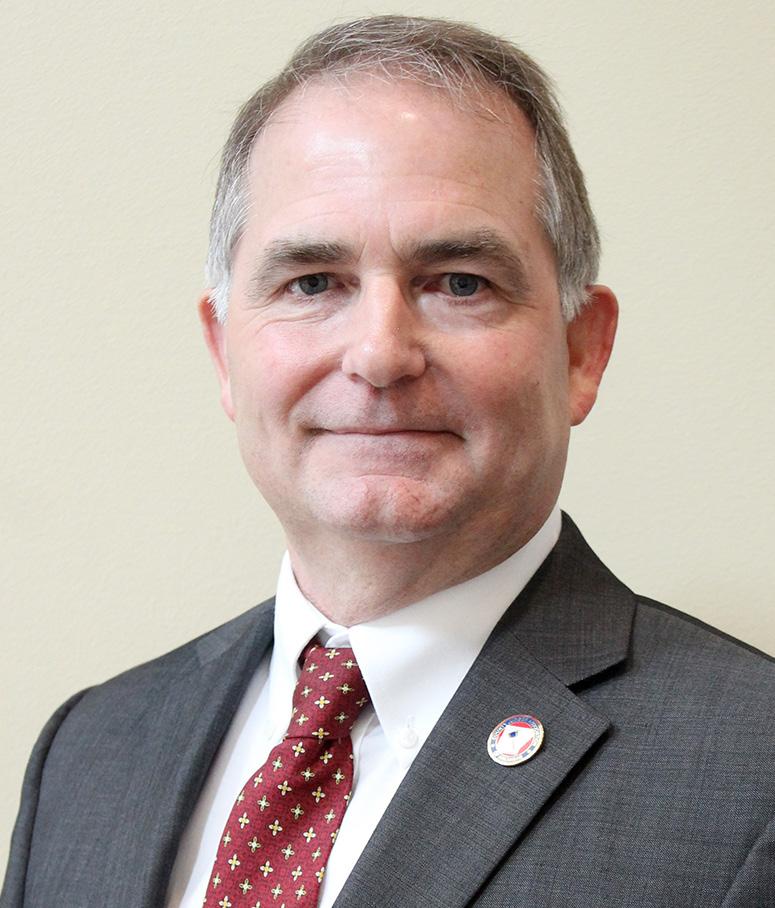
County: Polk
Board Position: Vice President
Elected Office: County Judge
AAC Board Service: 2014-Present
County Service: 2011-Present
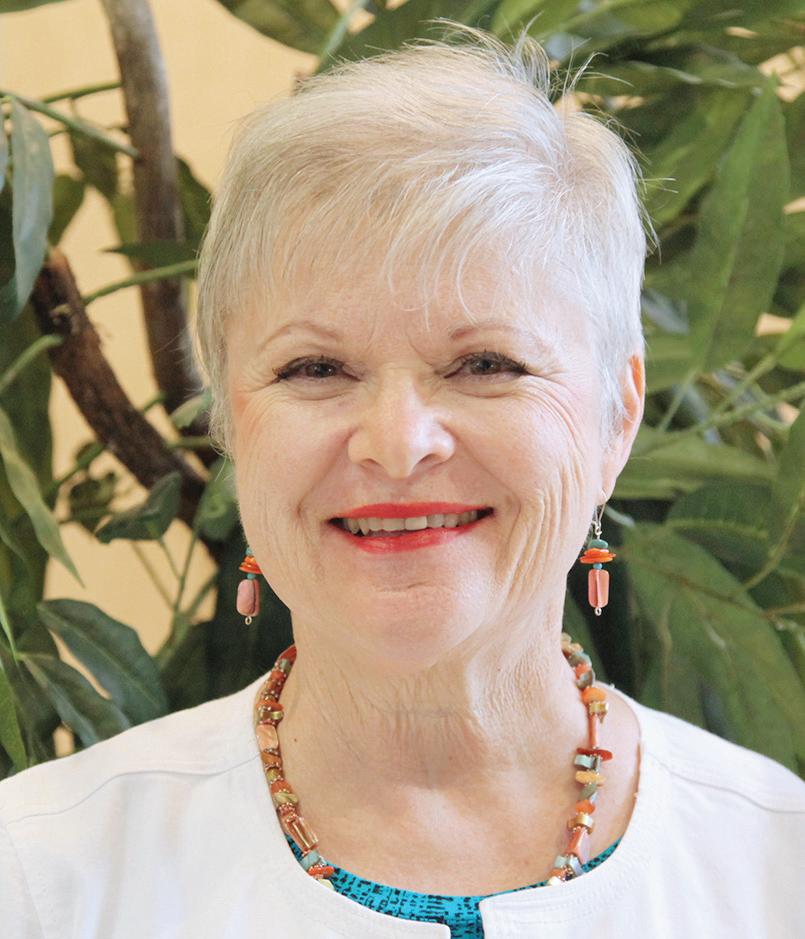
County: Pulaski
Board Position: Member
Elected Office: Treasurer/Collector
AAC Board Service: 2008-Present
County Service: 2001-Present
Brandon Ellison
What is your No. 1 priority as part of the AAC Board of Directors? To effectively influence decisions that affect all counties in Arkansas, thus the state. Whether it be policy, legislation, or the financial wellbeing of the counties we represent. I am a firm believer that county government should be really good at the fundamental things that private citizens can’t accomplish themselves. Such as, building a road across another’s property, hold elections, keep law and order, assess and collect taxes, or operate a jail. I do not believe we should overregulate or get involved with social programs, particularly in rural counties, where population is sparse. A priority would be to keep
Debra Buckner
What is your No. 1 priority as part of the AAC Board of Directors? {My} top priority is to engage officials from all counties to communicate transparently together. Share good ideas and real challenges Demonstrate authenticity. Find the common ground that our diverse 75 counties have and truly understand each other’s situations.
What advice would you offer to newer elected officials? You are unlikely to make a mistake that hasn’t happened before. Ask Questions! Your county was there before you and will be when you move on. Plug into everything AAC has to offer immediately! Reach out to leadership in your
it simple, where possible and to keep the state from imposing unfunded mandates.
What advice would you offer to newer elected officials? Read your individual manuals, read current statutes that pertain to your office, read anything Mr. Eddie Jones writes. Listen to veteran county officials, listen to the AAC staff (including Mr. Eddie Jones). I would advise not to make quick decisions unless the courthouse is on fire. The resources are available if you will make the effort to access them.
association. Remember that no matter what office you were voted into, you are a public servant. Be humble and a consensus builder.
36 COUNTY LINES, WINTER 2024

IT expert to help counties with cybersecurity
In a bid to fortify cybersecurity measures across Arkansas counties, seasoned IT expert Jim Grinder has assumed a key role within the Association of Arkansas Counties (AAC). Grinder’s extensive experience spans over two decades, marked by a relentless dedication to bolstering systems and network security.
Grinder’s journey into the realm of IT began at a young age, fueled by a passion for technology. Despite initially pursuing an Electrical Engineering degree, his fascination with Computer Science led him to specialize in Network and Systems engineering. With a diverse career background including stints at renowned companies such as Dillard’s, Acxiom, Conway Regional Health System, and Ritter Communications, Grinder brings a wealth of expertise to his current position at AAC.
At the forefront of the State and Local Cybersecurity Grant Program, Grinder spearheads efforts to secure substantial funding allocated to Arkansas. The initiative, backed by Homeland Security, aims to equip local and state governments with re-
sources to tackle cybersecurity risks and threats effectively.
Acknowledging the diverse array of cybersecurity challenges faced by counties, Grinder emphasizes the importance of proactive measures. From ransomware to phishing attacks, counties confront multifaceted threats that necessitate vigilant monitoring and strategic interventions. Recognizing the urgency, Grinder is poised to collaborate with vendors and county officials to conduct comprehensive assessments and implement robust security solutions.
Grinder’s commitment extends beyond mere technical expertise; he serves as a bridge between vendors and counties, ensuring seamless communication and optimal utilization of resources. His vision is to empower counties, regardless of their technical proficiency, to enhance their cybersecurity posture and safeguard vital systems and networks.
Through strategic initiatives and collaborative partnerships, Grinder aims to navigate the evolving cybersecurity landscape and pave the way for a more secure digital future.
AAC STAFF PROFILE
Jim Grinder joined the AAC staff as Cyber/Network Security Engineer in January. He will work closely with counties on cyber security.
— Photo by Christy L. Smith
COUNTY LINES, WINTER 2024 37
AAC PHOTO RECAP TREASURERS
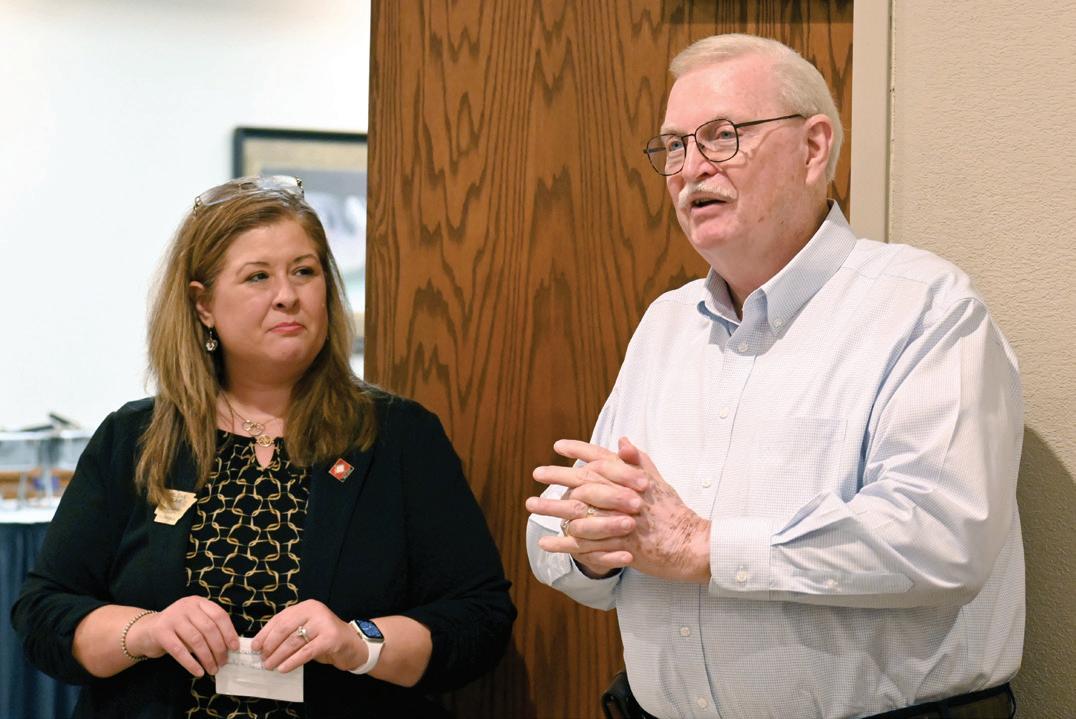

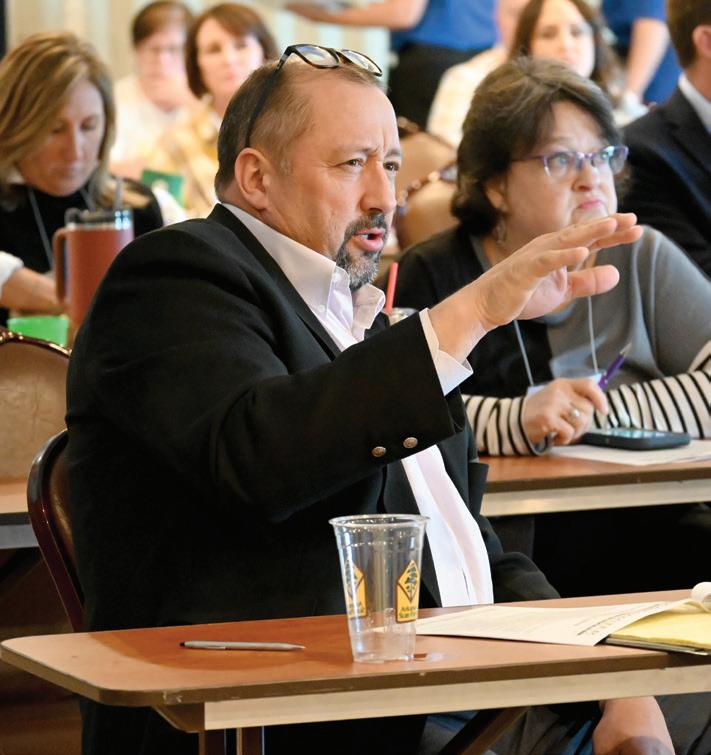
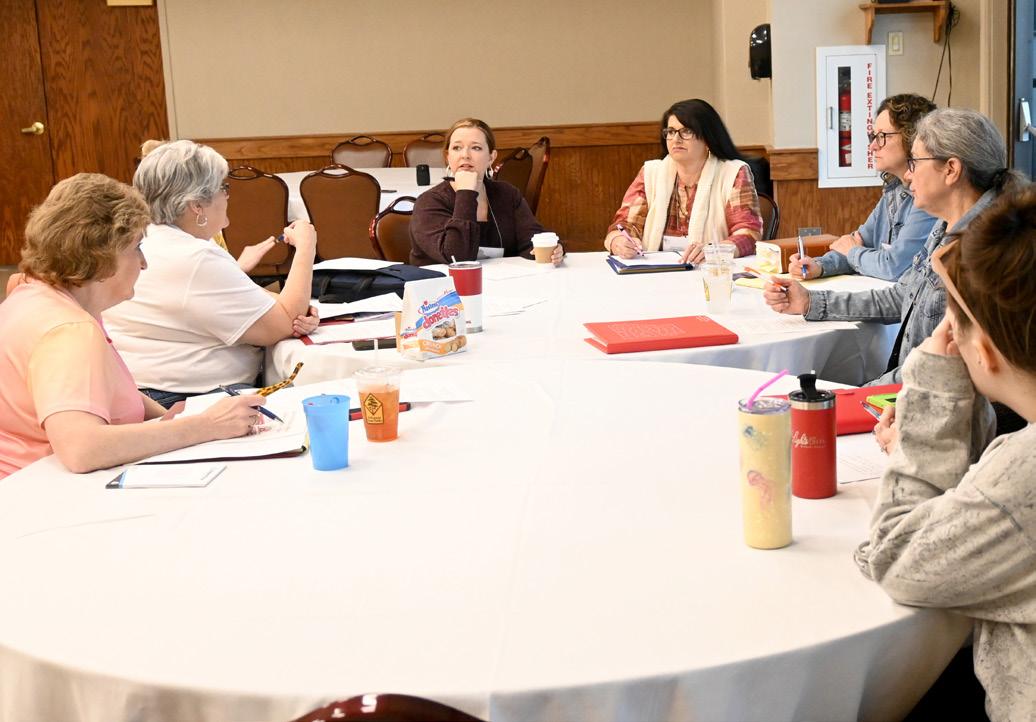

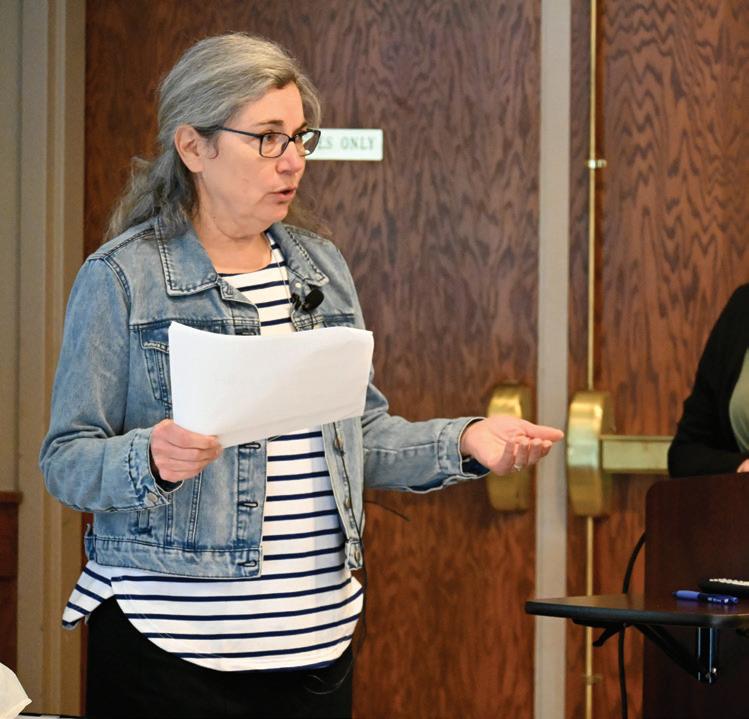 The Arkansas County Treasurers Association gathered March 5-7 at DeGray Lake State Park in Clark County.
Above: Eddie Jones expresses his appreciation after Arkansas County Treasurers Association President Selena Blair, left, announced that the association has named its scholarship in his honor.
Above: Little River County Chief Deputy Treasurer Brenda Snead uses binoculars to look at an eagle nest during a scenic cruise around DeGray Lake.
Left: Treasurers from Class 4 counties have a discussion during a roundtable portion of the meeting.
Right: Baxter County Treasurer Jenay Mize leads the group in a discussion about property tax relief.
Right: Izard County Treasurer Warren Sanders asks a question during a presentation led by Mike Rainwater.
The Arkansas County Treasurers Association gathered March 5-7 at DeGray Lake State Park in Clark County.
Above: Eddie Jones expresses his appreciation after Arkansas County Treasurers Association President Selena Blair, left, announced that the association has named its scholarship in his honor.
Above: Little River County Chief Deputy Treasurer Brenda Snead uses binoculars to look at an eagle nest during a scenic cruise around DeGray Lake.
Left: Treasurers from Class 4 counties have a discussion during a roundtable portion of the meeting.
Right: Baxter County Treasurer Jenay Mize leads the group in a discussion about property tax relief.
Right: Izard County Treasurer Warren Sanders asks a question during a presentation led by Mike Rainwater.
38 COUNTY LINES, WINTER 2024
Far Right: Yell County Treasurer Debra Craig listens to Eddie Jones speak as Cleburne County Treasurer Angie Kimsey jots down notes.
ASSESSORS
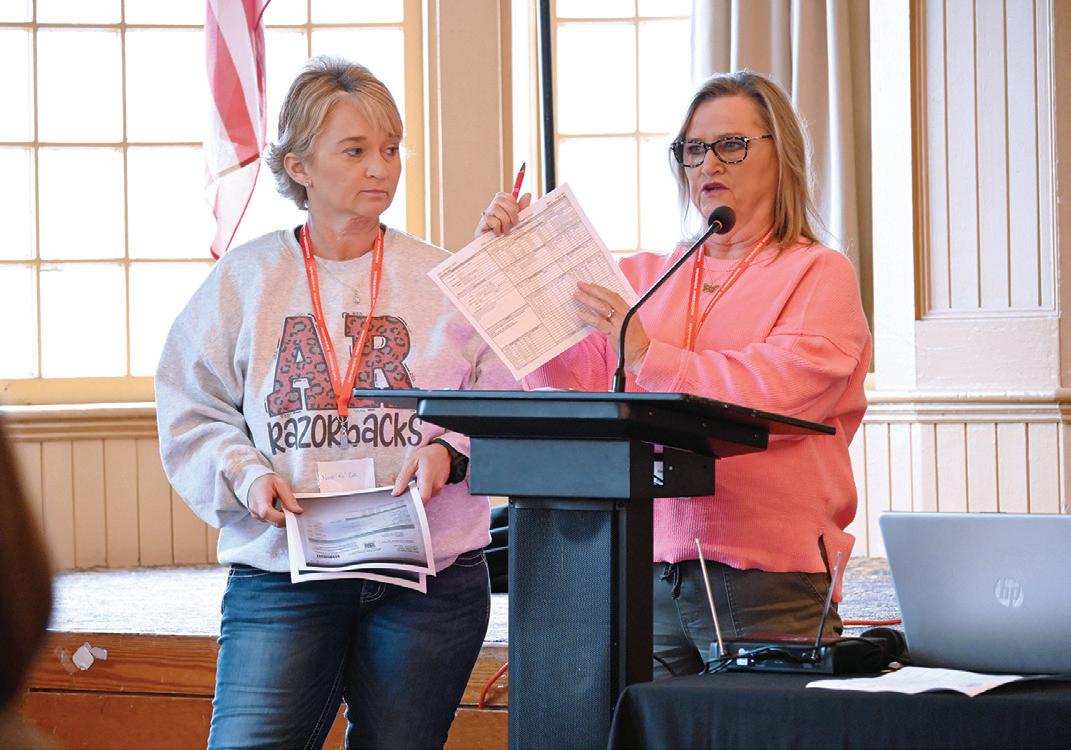



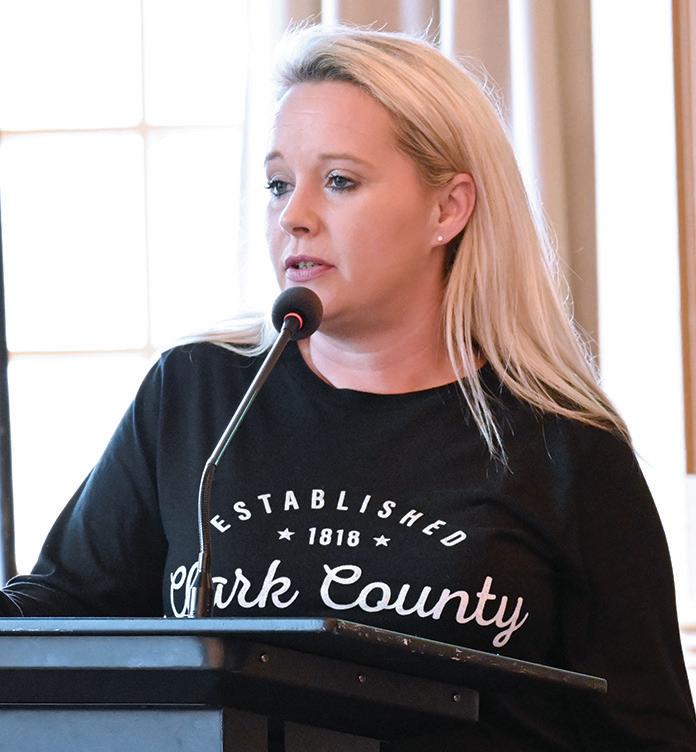

AAC PHOTO RECAP
County Assessors convened March 5-8 in Eureka Springs/ Carroll County.
Above Left: Eureka Springs Historian Bill Ott shared some of his knowledge with the assessors. Above Middle: Clark County Assessor Mona Vance shares some of the experiences she has had during her first year in office. Above Right: Pike County Assessor Staci Stewart also discusses some of the experiences and challenges of her first year in office.
Top Left: Logan County Assessor Shannon Cotton and White County Assessor Gail Snyder share what they discussed in their roundtable group. Topics ranged from assessing Airbnbs, Crypto mines, solar panels, and much more.
Above: Desha County Assessor Jessica Ferguson turns to look at a speaker.
COUNTY LINES, WINTER 2024 39
Left: Lawrence County Assessor Becky Holder and Arkansas County Assessor Marcia Theis enjoy a presentation.
AAC PHOTO RECAP COUNTY CLERKS
The Clerks met Feb. 14-16 in Texarkana/Miller County.

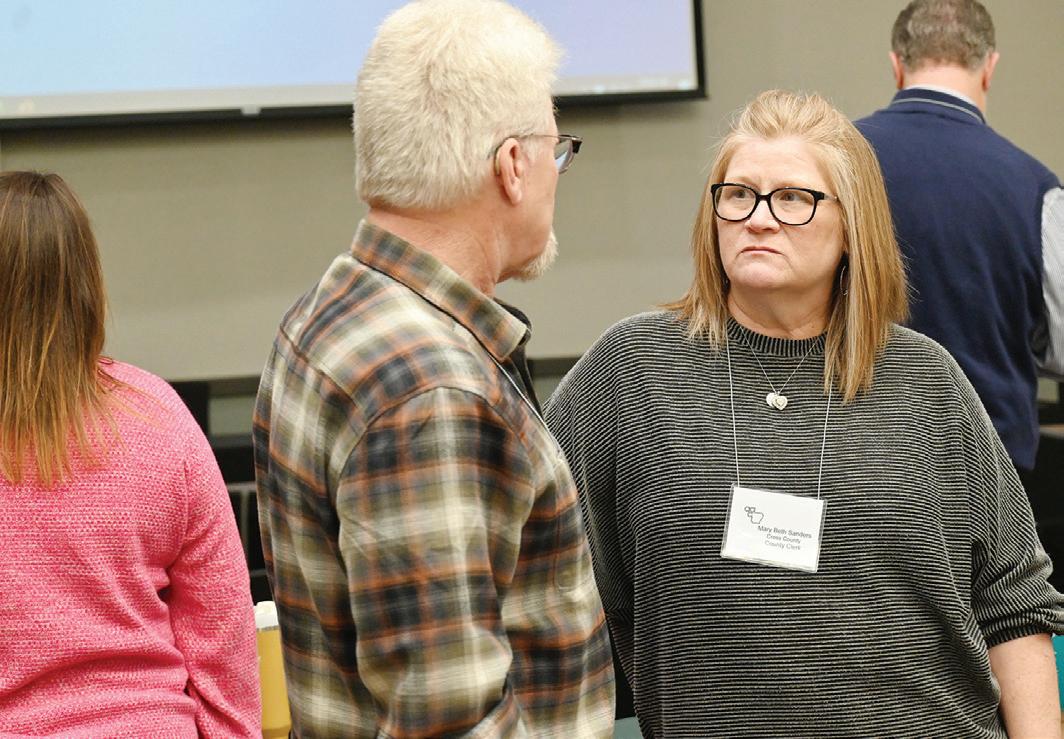
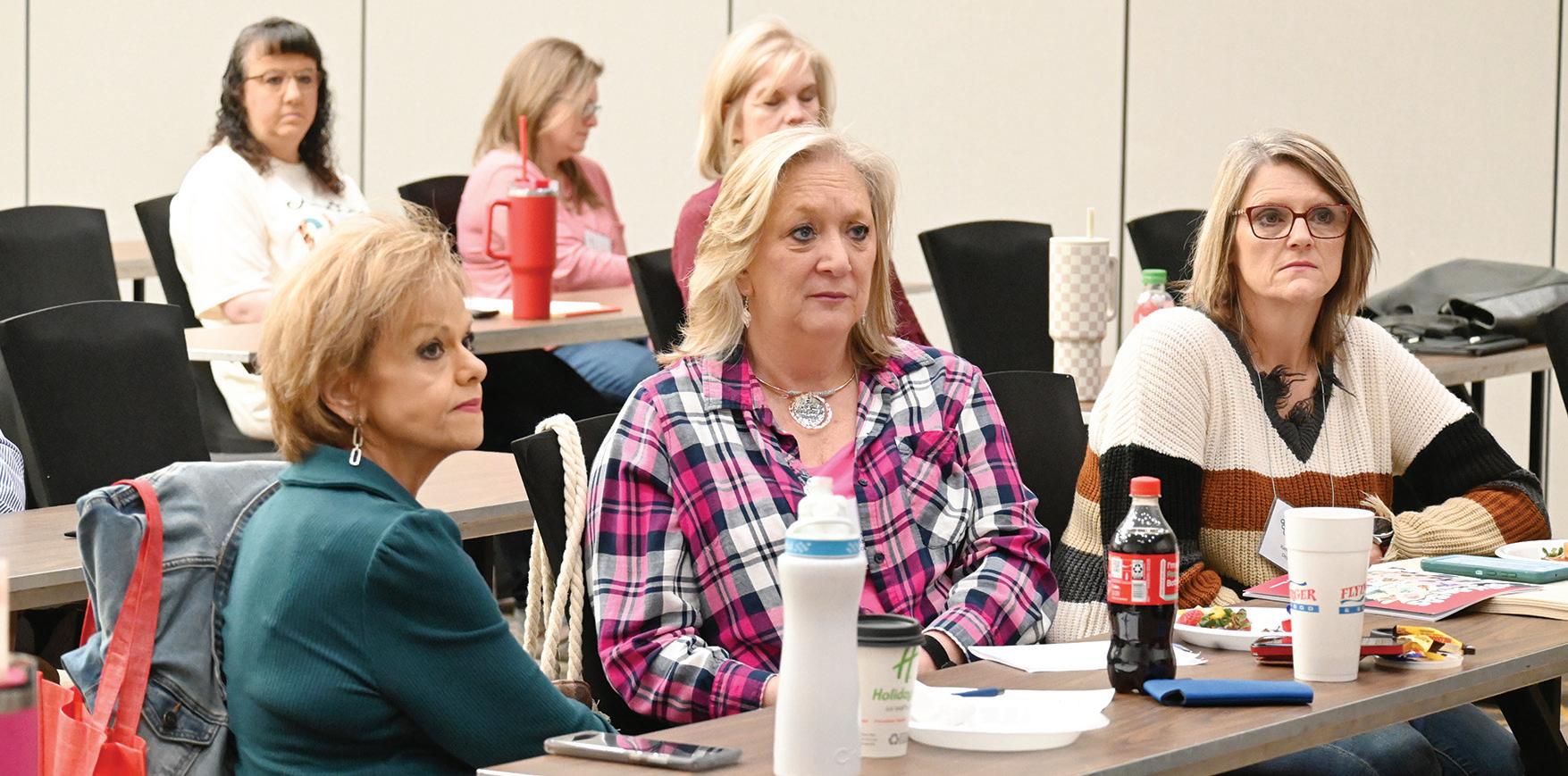
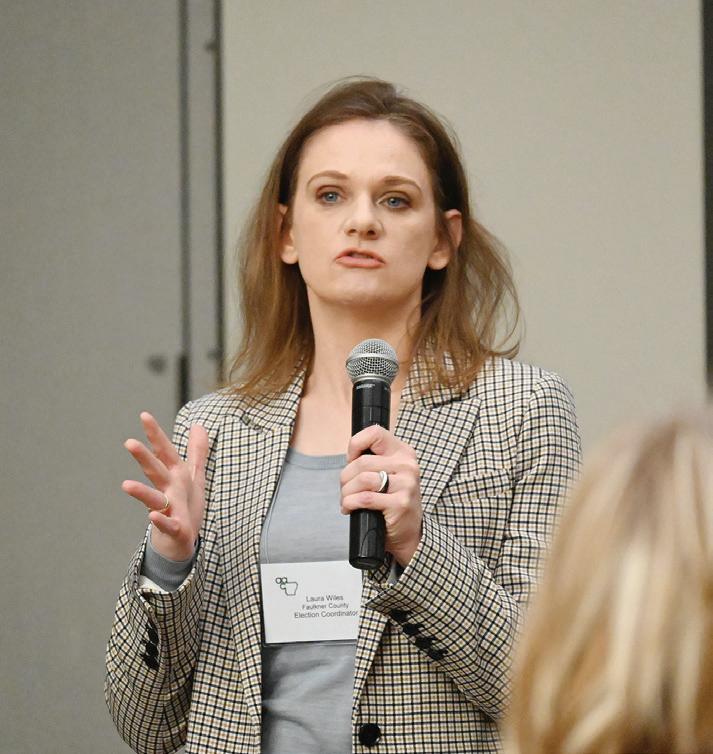
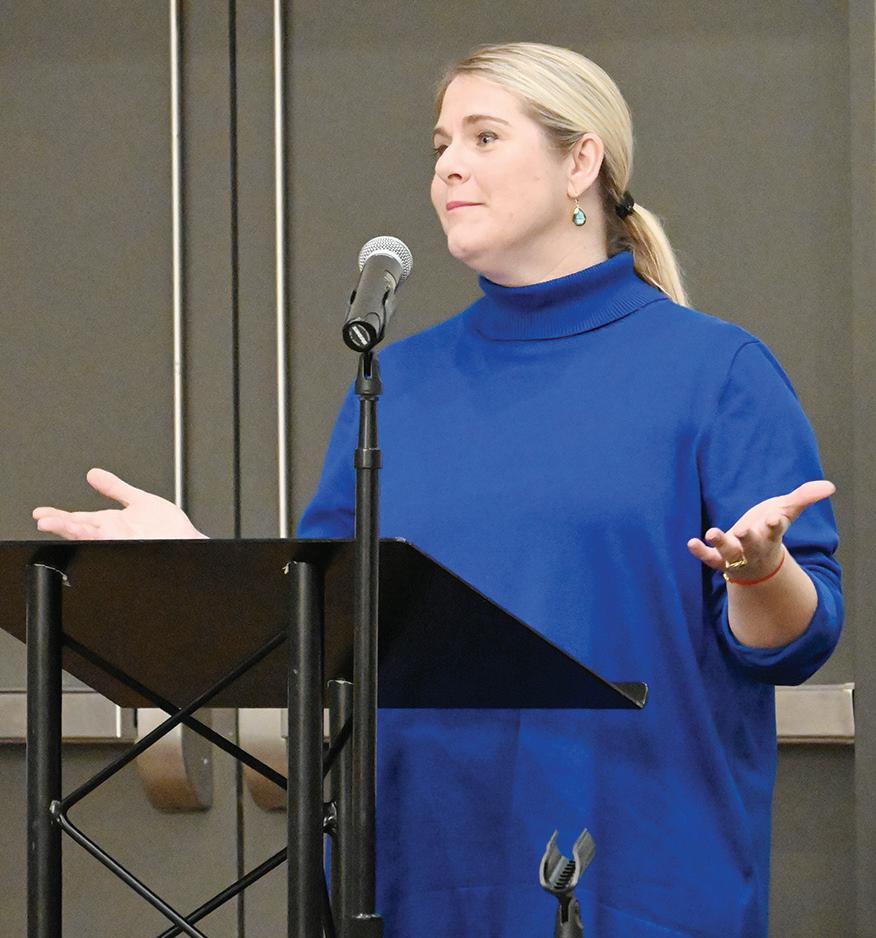
Kimble
Rhonda Blevins, and Randolph County
Clerk Jerri Moore
attention to one of the speakers. This meeting marked the first one Moore had attended, and she said it was a valuable experience, particularly because she had the opportunity to meet clerks and staff from across the state.
with their feet firmly on the ground, closed their eyes, and focused on their breathing.
Above: Nevada County Clerk Tammie Rose laughs during a lighthearted discussion.
Above: Saline County Clerk Doug Curtis, president of the association, speaks to Cross County Clerk Mary Beth Sanders.
Left: Columbia County Clerk Tammy
Wiltz, Randolph County Clerk
Deputy
pay
40 COUNTY LINES, WINTER 2024
Left: Faulkner County Election Coordinator Laura Wiles answers questions during an open forum on Post Election Reporting. Right: Kerrie Lauck, a mindfulness coach and trainer, talks to the group about Building Resilience and Well Being. Her presentation included a stress reduction and mindfulness exercise during which attendees sat
COUNTY SHERIFFS
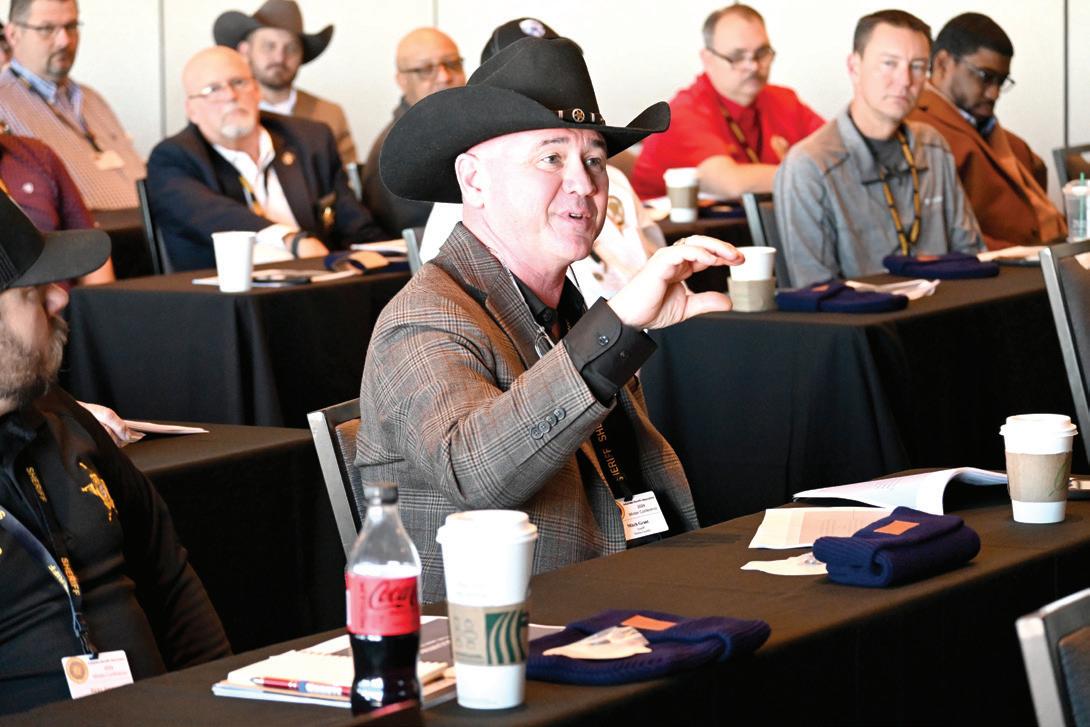
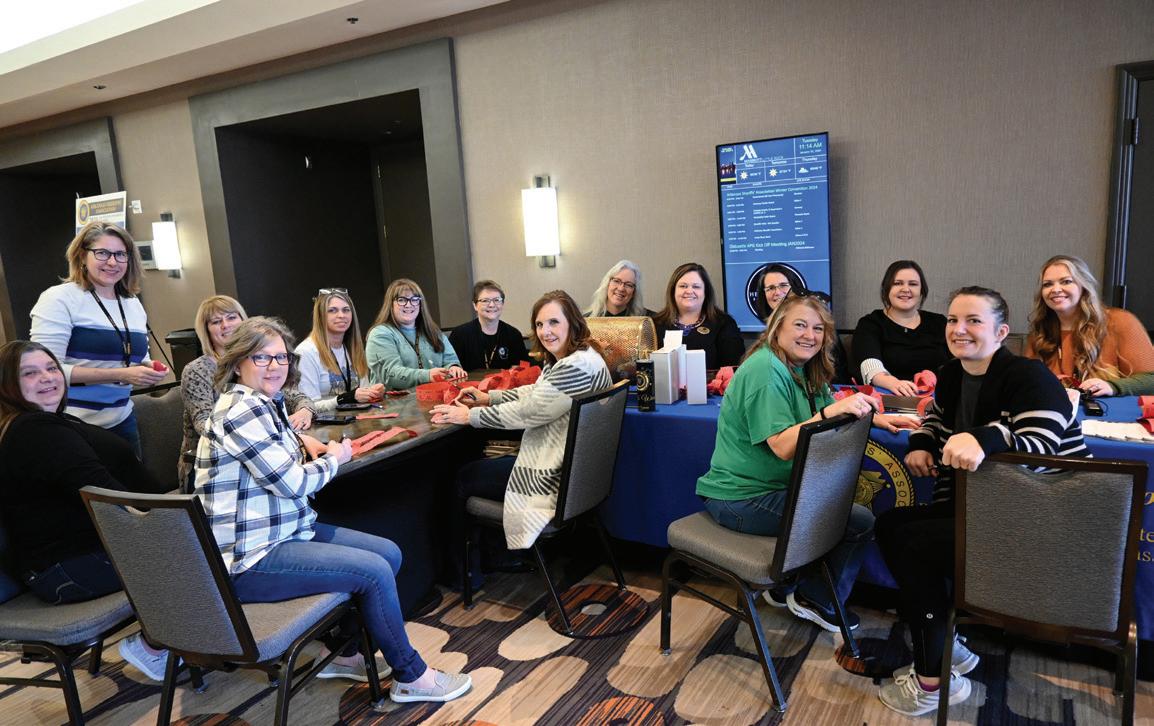
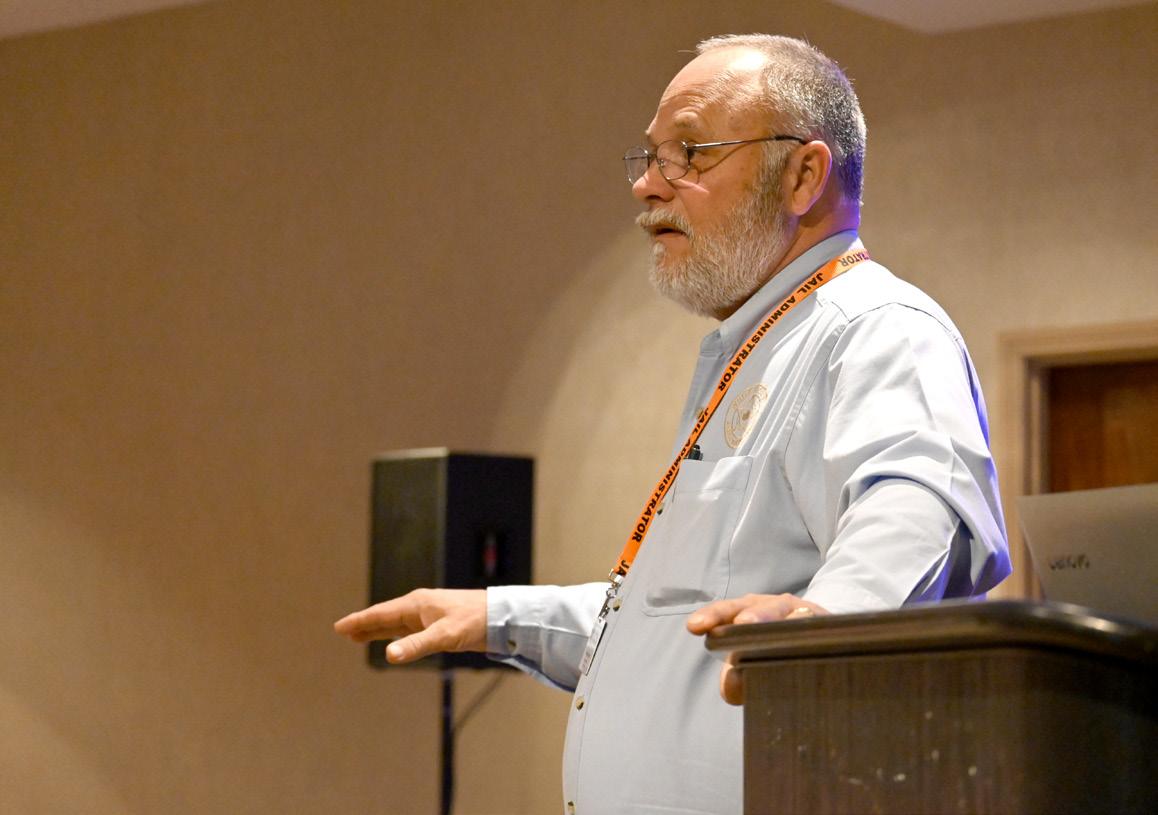
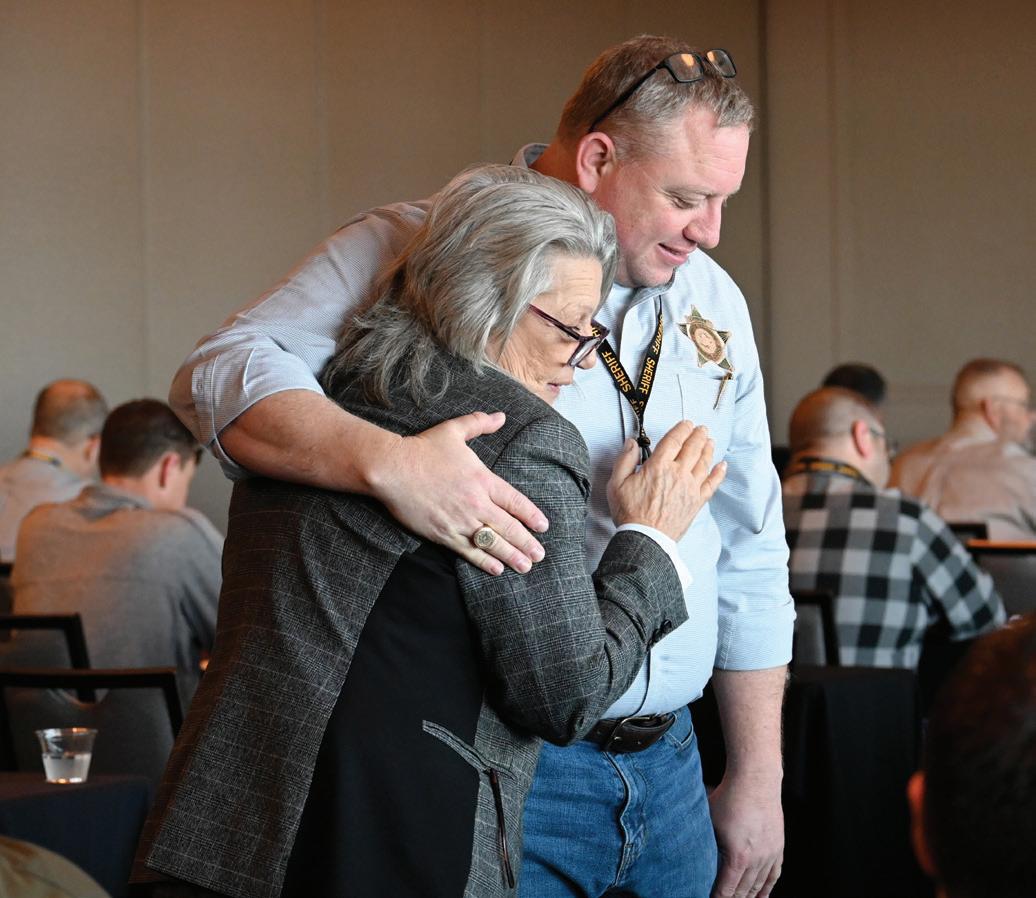
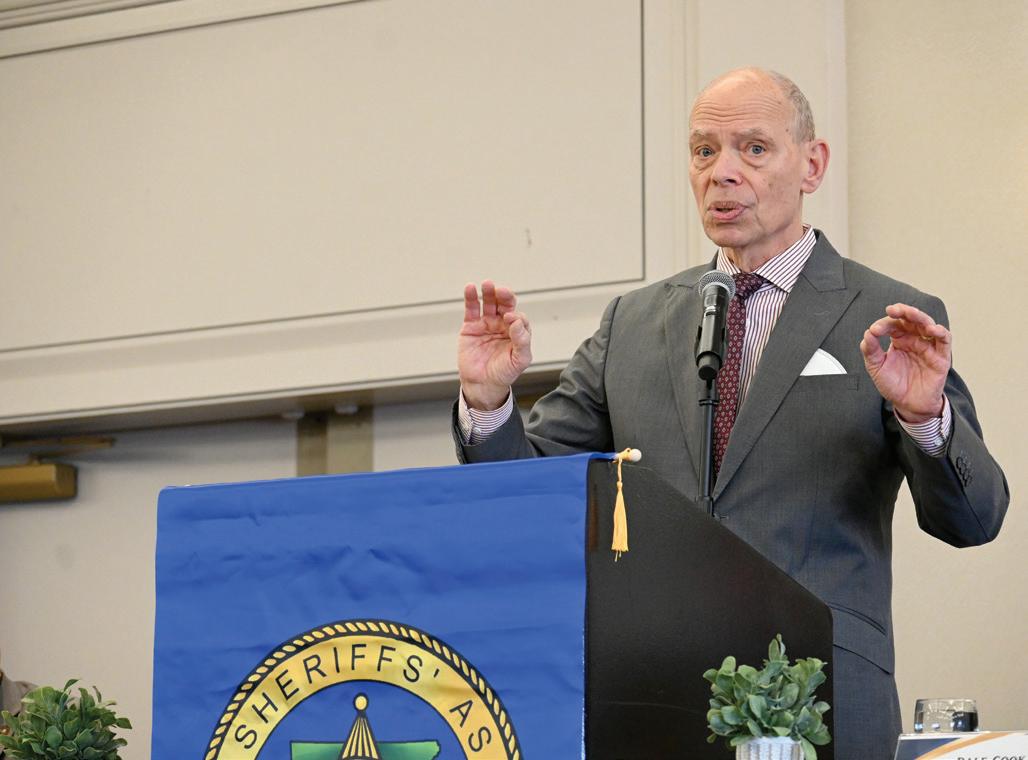
AAC PHOTO RECAP
The Arkansas Sheriffs Association gathered in Little Rock/ Pulaski County for it Winter Conference.
Above Left: President of the Jail Administrators Association, Clayton Edwards, speaks with fellow administrators during a open discussion portion of their training. Above Right: Longtime radio and broadcast journalist Craig O’Neill served as the keynote speaker during one of the association’s luncheons. Attorney General Tim Griffin was the guest speaker for the association’s second luncheon.
Top Left: Desha County Sheriff Mitch Grant asks a question during a presentation made by RMS Legal Counsel Mallory Floyd.
Above: White County Sheriff Phillip Miller shares a hug with Criminal Justice Institute Director Dr. Cheryl May.
COUNTY LINES, WINTER 2024 41
Left: The Arkansas Sheriffs’ wives pose for a group photo while preparing tickets for a raffle. Through the raffle, they raised $6,000 for the Sheriffs’ Wives Scholarship.
AAC PHOTO RECAP ARORP TRAINING
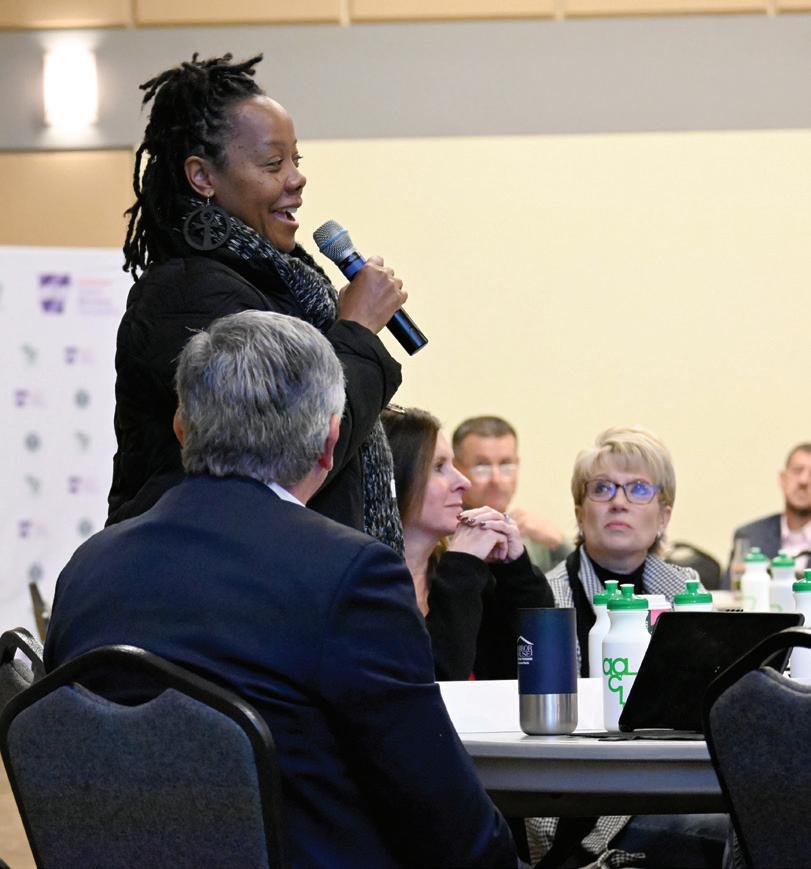
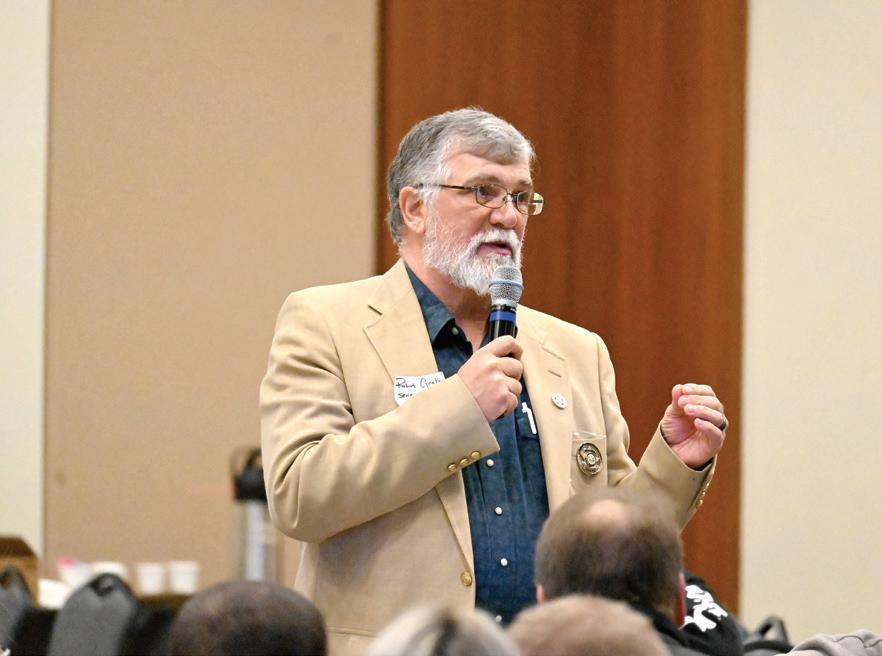
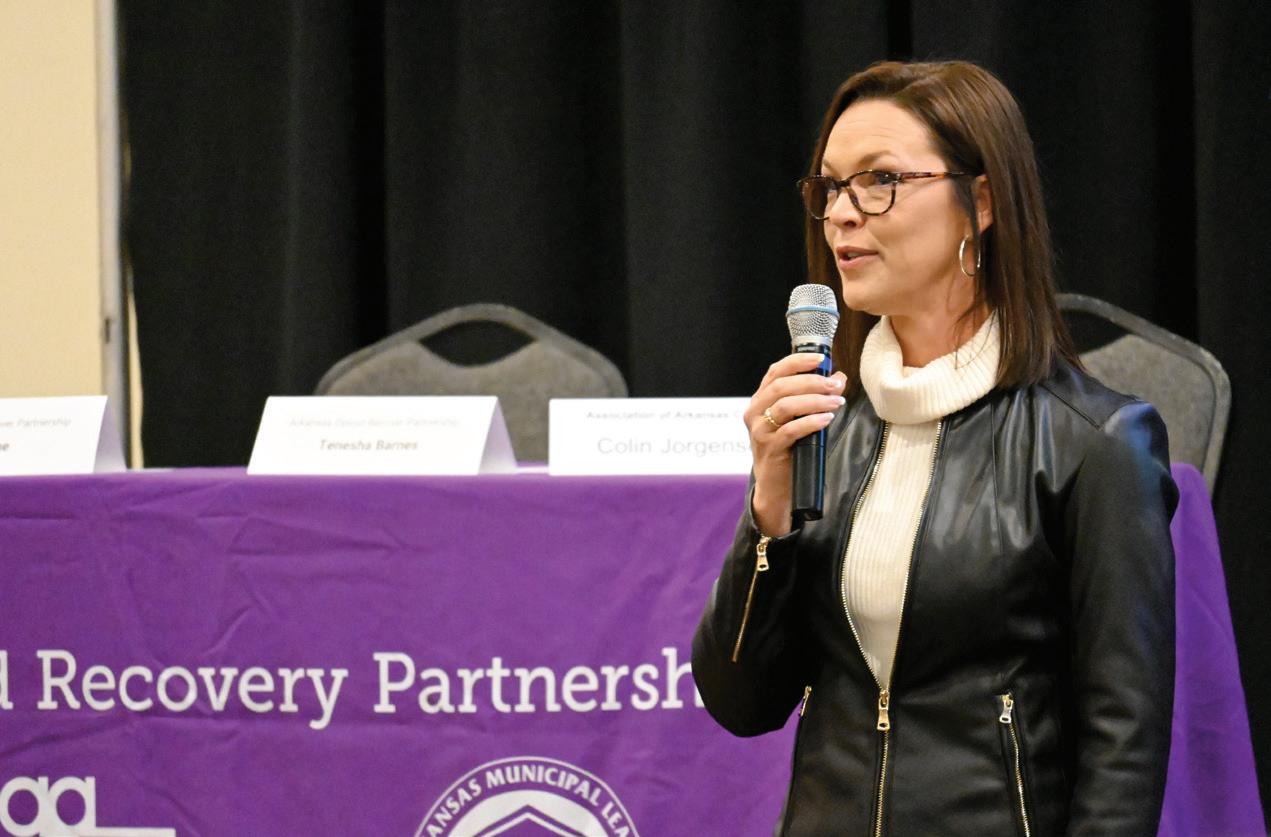
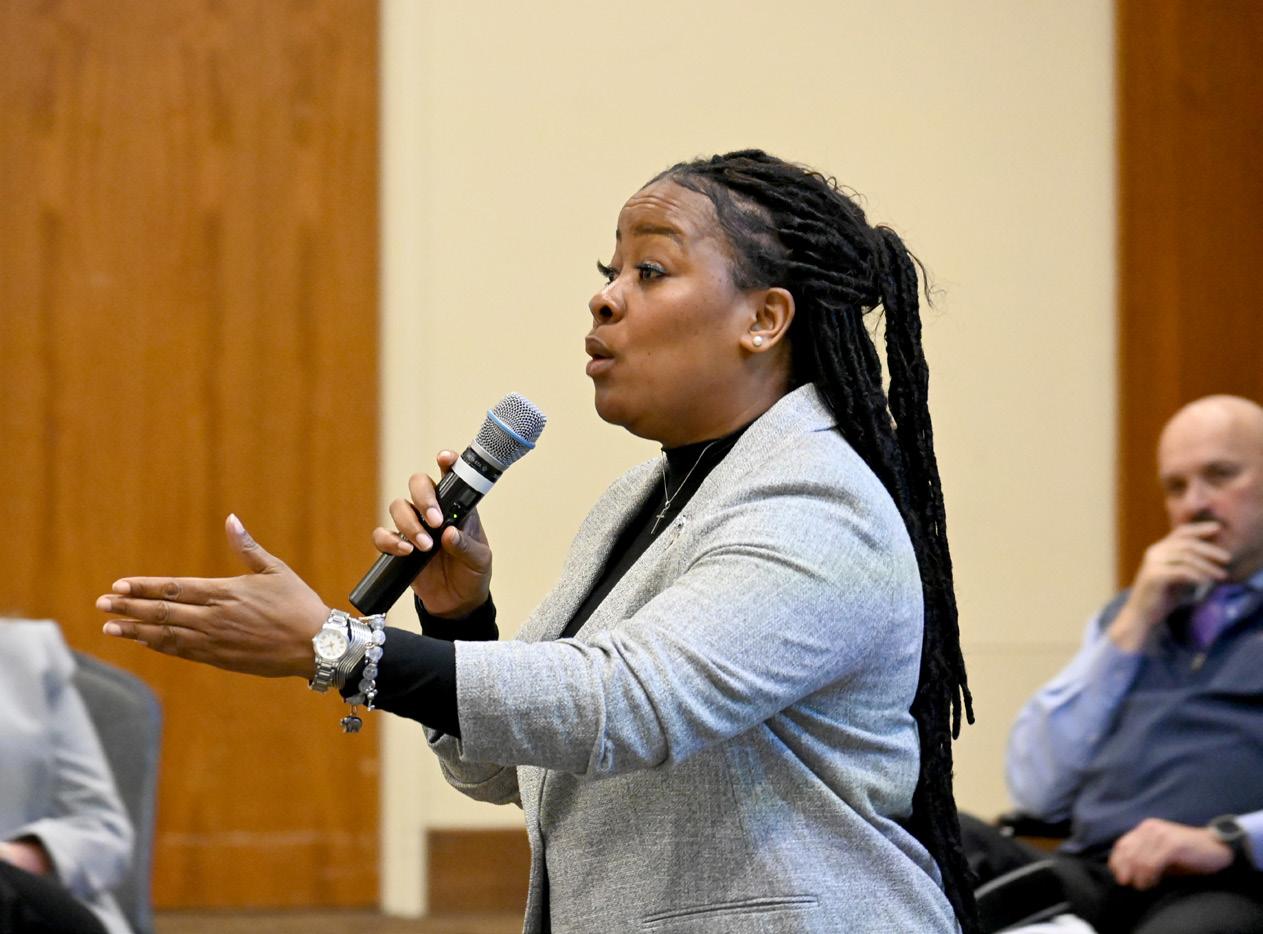
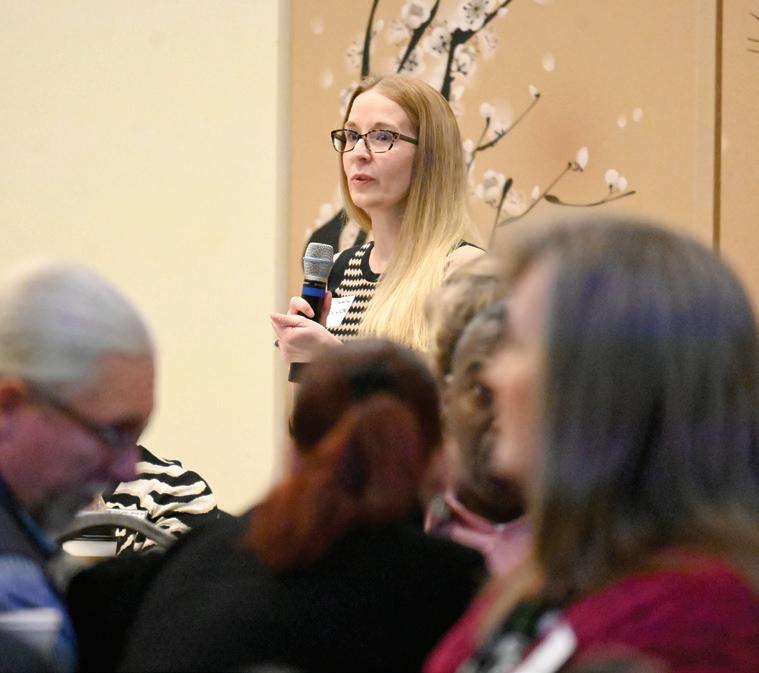
 Representatives from 98 Arkansas Opioid Recovery Partnership projects gathered Dec. 6 in Saline County to discuss projects and build a network of support.
Above: Lanina Watson introduces herself and the Healing in the Hood program in Mississippi County to the group.
Above: Staci James, founder of the Hope Movement, tells her story of losing her son to an overdose.
Above: ARORP Deputy Director Tenesha Barnes responds to a question as Director Kirk Lane looks on.
Above: Sevier County Sheriff Robert Gentry talks about how his views on addiction have changed.
Right: Dr. Stephanie Rose, a professor at the University of Central Arkansas, speaks with the group about the project at UCA to provide naloxone and training for students and others in the community.
Representatives from 98 Arkansas Opioid Recovery Partnership projects gathered Dec. 6 in Saline County to discuss projects and build a network of support.
Above: Lanina Watson introduces herself and the Healing in the Hood program in Mississippi County to the group.
Above: Staci James, founder of the Hope Movement, tells her story of losing her son to an overdose.
Above: ARORP Deputy Director Tenesha Barnes responds to a question as Director Kirk Lane looks on.
Above: Sevier County Sheriff Robert Gentry talks about how his views on addiction have changed.
Right: Dr. Stephanie Rose, a professor at the University of Central Arkansas, speaks with the group about the project at UCA to provide naloxone and training for students and others in the community.
42 COUNTY LINES, WINTER 2024
Far Right: Arkansas State Drug Director Tom Fisher explains improvements that are being made on the state level such as bridging the gap between the state’s public safety and public health departments and collecting better data to combat drug trends.
AAC PHOTO RECAP COUNTY COLLECTORS
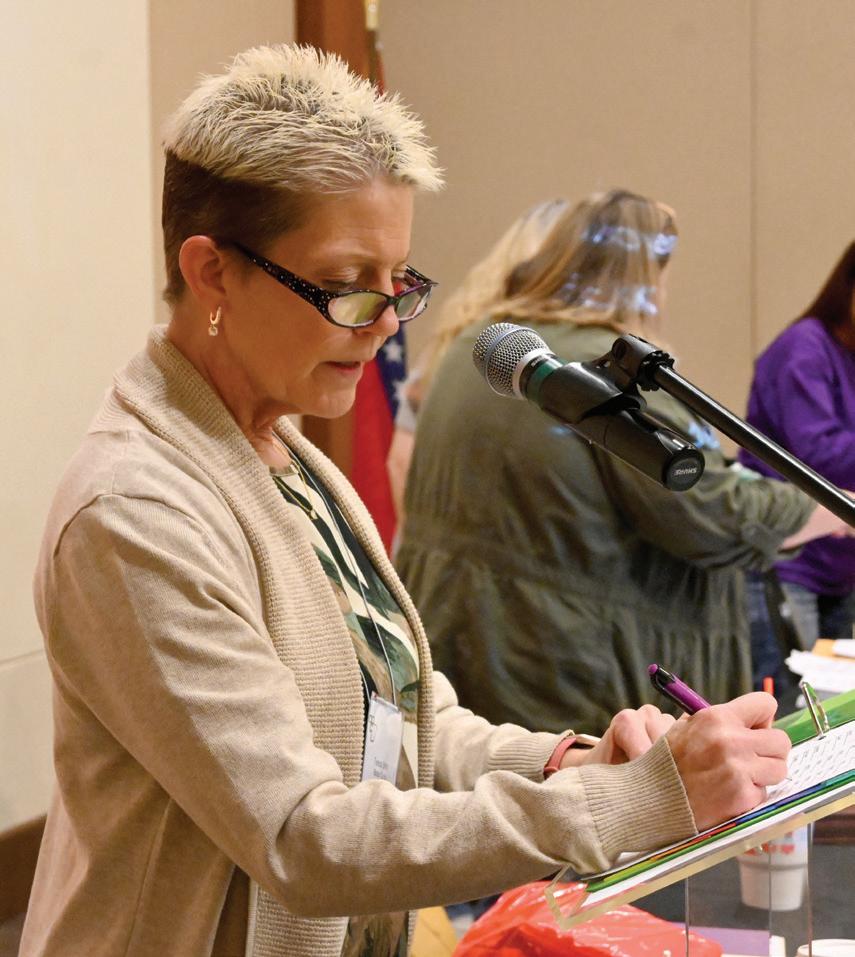
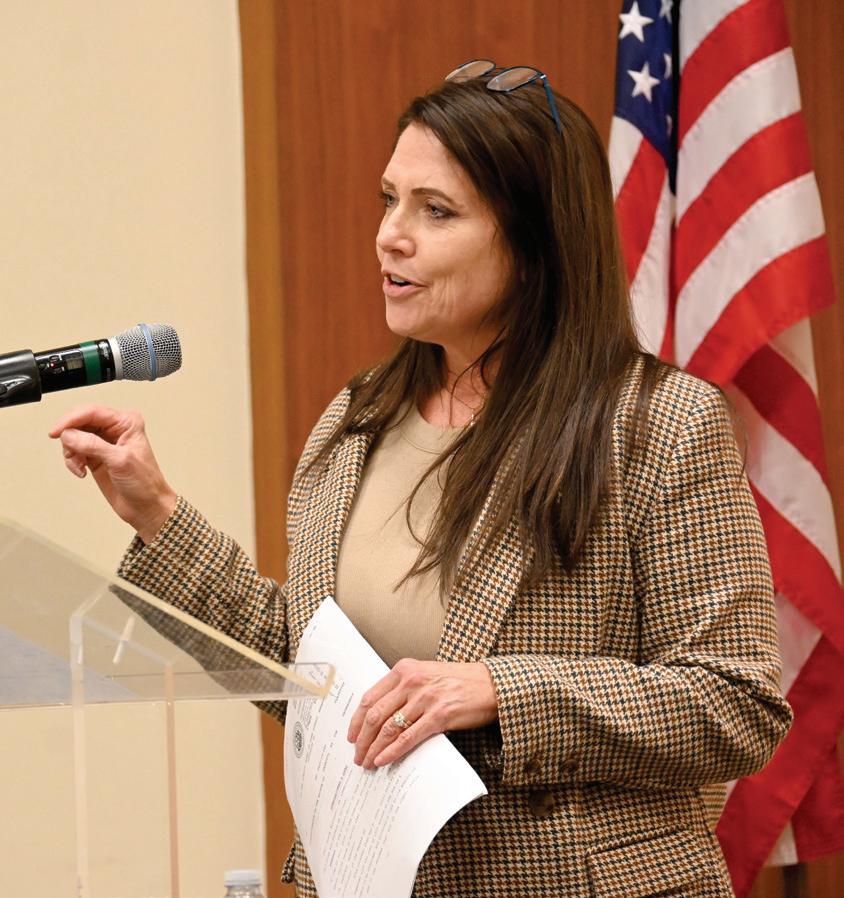
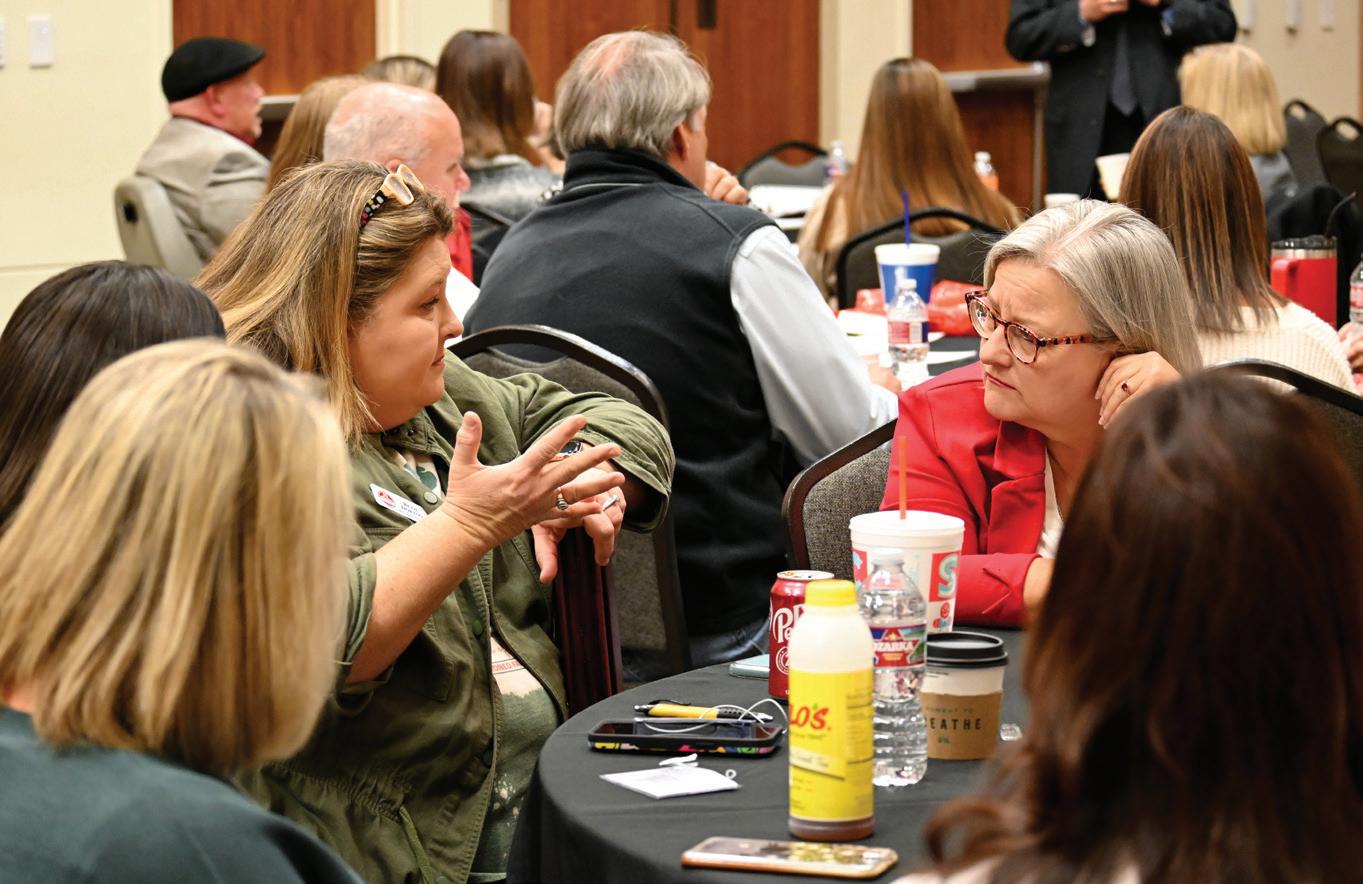

 The Arkansas County Treasurers’ Association held its winter meeting Dec. 6-8 in Saline County.
Above left: Pope County Collector Jennifer Haley speaks with the group about her experience with foreclosures. Above right: AAC Governmental Affairs Director Josh Curtis, left, and ACE Program Coordinator Michael Roys act out a scene with Roys acting as a supervisor and Curtis acting as an employee during a human resources presentation by RMS Legal Counsel Mallory Floyd.
Left: Saline County Chief Deputy Collector Rachel Buffington, left, and Collector Jennifer Carter are all smiles while attending the meeting in their home county.
The Arkansas County Treasurers’ Association held its winter meeting Dec. 6-8 in Saline County.
Above left: Pope County Collector Jennifer Haley speaks with the group about her experience with foreclosures. Above right: AAC Governmental Affairs Director Josh Curtis, left, and ACE Program Coordinator Michael Roys act out a scene with Roys acting as a supervisor and Curtis acting as an employee during a human resources presentation by RMS Legal Counsel Mallory Floyd.
Left: Saline County Chief Deputy Collector Rachel Buffington, left, and Collector Jennifer Carter are all smiles while attending the meeting in their home county.
COUNTY LINES, WINTER 2024 43
Right: White County Collector Beth Dorton has a discussion with Hot Spring County Collector Sheri Oden. Below: Baxter County Collector Teresa Smith kicks off the meeting by calling the roll.

www.naco.org
About NACo – The Voice of America’s Counties
National Association of Counties (NACo) is the only national organization that represents county governments in the U.S. NACo provides essential services to the nation’s 3,068 counties. NACo advances issues with a unified voice before the federal government, improves the public’s understanding of county government, assists counties in finding and sharing innovative solutions through education and research and provides value-added services to save counties and taxpayers money.
Intergovernmental partnerships offer strategy for mental health crisis
Story by Meredith Moran County News Junior Staff Writer/NACo
Federal, state and local government need to work together to prioritize prevention in addressing the nation’s mental health crisis, according to U.S. Department of Health and Human Services (HHS) Sec. Xavier Becerra.
Waiting to treat an individual until they reach a breaking point in their physical or mental health isn’t a sustainable approach; it’s more expensive for healthcare systems and it’s costing people their livelihood, Becerra said.
“Diabetes is about to take your leg, your vision,” Becerra said. “You have heart disease, you just got laid off because you had a heart attack and survived it. You’re now in recovery and you can’t go to work. We wait until the illness hits you, and that’s expensive. How about we change our healthcare system from one that treats illness to one that sustains wellness?”
Wellness is also about mental health, Becerra said.
Suicide is the second leading cause of death for people aged 10-24, and ER visits are on the rise for children even younger; CDC data shows that in 2020, there was a 24% surge in ER visits for children aged five to 11 experiencing mental health crises.
In an effort to combat the youth mental health crisis, Becerra said that HHS is looking to partner with schools to establish behavioral programs on schoolgrounds.
“A nine-year-old is saying ‘I don’t think I’m going to live anymore.’ We can’t wait,” Becerra said. “… It’s easier to build strong children than to repair broken men,” he added, quoting Frederick Douglass.
The 24/7 suicide and crisis lifeline 988, similar to the 911 system, provides professional support to people who reach out during a mental health crisis. It is a resource created with youth in mind. The hotline is available through call and text for increased accessibility and is a way for people to seek help without feeling stigmatized or scared, particularly young children who might feel as if they don’t have anywhere else to go, according to Becerra.
The CDC’s Comprehensive Suicide Prevention Program is another federal funding source created to help groups dispro-
portionately affected by suicide, including youth, veterans, tribal populations, people living in rural areas and the LGBTQ+ community. The CSP funds 24 programs across the country to implement and assess a public health approach to suicide prevention — one of the programs is through Bexar County, Texas’ hospital district.
“We need to make sure that we’re meeting people where they are — leaning in, in our schools, in our communities,” said Andi Lipstein Fristedt, deputy director of policy, communications and legislative affairs, for the CDC.
The co-occurrence of substance use disorder and mental health must be addressed, Becerra said. He highlighted HHS’ support of harm reduction programs at the county level, including those that distribute fentanyl strips, which is something the department was previously prohibited from funding.
“The facts on the ground are overwhelmingly positive with that and we try to prevent people from committing too much harm for themselves while they’re in the state of addiction,” Becerra said. “… Drug use is a disease, and stigma isn’t going to get rid of it.”
AAC NEWS FROM NACO
SAVE THE DATE 2024 NACo Annual Conference & Exposition July 12-15 Hillsborough County, Florida
44 COUNTY LINES, WINTER 2024
Members enjoy dividends! $32 Million paid since 1997
When you participate in the AAC Workers’ Compensation Trust, you can relax in the hands of professional staff members who are going to take care of your needs. The AAC team has decades of experience in handling county government claims – they’re simply the best at what they do!
Did we mention that participants in our plan are accustomed to getting money back? Since we started paying dividends in 1997, the AAC Workers’ Compensation Trust has declared more than $32 MILLION dollars in dividends, payable to members of the fund. In fact, we mailed $650,000 in savings back to member counties in July 2023.
The service is available for any size county government and other county government-related entities.
We’ve got you covered!


1415 West Third Street • Little Rock, Arkansas 72201
Association of Arkansas Counties Workers’ Compensation Trust
Experienced & licensed examiners covered We’ve got you Debbie Norman Risk Management & Insurance Director 501.375.8247 Misty Petrus Claims Manager 501.375.8698 Kim Nash Claims Adjuster 501.375.8805, ext. 546 Renee Turner Claims Adjuster 501.375.8805, ext. 545 Kim Mitchell Premium Analyst 501.375.8805, ext. 541 Ellen Wood Admin. Assistant 501.375.8805, ext. 540 Brandy McAllister RMF General Counsel 501.375.8694
FOIA
retention of county records and how long those records must be kept. Those records are public records as long as they are kept in your office, whether within the statutorily required time frame, or after. Additionally, there are many public records in your office such as emails, notes, correspondence with the public — the list is endless — that do not have to be kept for a certain period or kept at all. However, if you do keep those records, they are public records that are subject to Arkansas FOIA requests.
An Arkansas citizen may also request a record from you that you do not possess. In 2023, there was a massive public push from a national pillow salesman to inundate county clerks with requests for certain documents related to voting machines. The voting machines used in Arkansas did not produce these specific reports; therefore, Arkansas county clerks did not possess these records. If someone requests a record that you do not have custody of, you should respond that no such record exists in your custody. There is a caveat here that if they simply asked the wrong department or county office, you should direct them to the custodian of an existing record if possible.
Additionally, if a county official utilizes an outside vendor
to store its records electronically, the county must maintain administrative control over those records and turn them over if requested by an Arkansas resident.
Finally, under §25-19-105(d)(2)(C), a “custodian is not required to compile information or create a record in response to a request ....” Often, county officials will get a request for a report that contains a complete list of county employee names, addresses, date of hire, ethnicity, base pay, overtime pay, bonus pay, etc. You can likely easily run a file in your payroll software that would give you most of the information requested. This would likely satisfy the request. You do not have to compile special reports of information or create a record if one does not exist or is not accessible on software that is readily available.
In conclusion, this article is intended to help you wade through the influx of FOIA requests all county offices receive. I know it can be overwhelming trying to respond to them while keeping your office running smoothly. If you’ll consider these three points first before looking at the substance of the request, you’ll be able to cut down on at least a portion of your requests immediately, and that means more time for you and your employees to do the job you were elected or hired to do.
This publication was made possible with the support of these advertising partners who have helped to underwrite the cost of County Lines. They deserve your consideration and patronage when making your purchasing decisions. For more information on how to partner with County Lines, please call Christy L. Smith at (501) 372-7550.
Advertiser Resource Index AAC Workers’ Compensation . . . . . . . . . . . . . . . . . . . . . . . . . . . . . . . . . . . . . 45 Apprentice Information Systems 47 ARBuy 11 Crews and Associates Back Cover DataScout Inside Front Cover Ergon Asphalt & Paving 4 Financial Intelligence . . . . . . . . . . . . . . . . . . . . . . . . . . . . . . . . . . . . . . . . . 13 Guardian RFID . . . . . . . . . . . . . . . . . . . . . . . . . . . . . . . . . . . . . . . . . . . 15 Nationwide Insurance 25 Rainwater Holt & Sexton, PA 3 Southern Tire Mart 8 Tax Pro 10
AAC LEGAL CORNER
Page 20 <<<
Continued From
46 COUNTY LINES, WINTER 2024

TOGETHER, WE CAN BUILD INCREDIBLE THINGS.





When it comes to your county, you’re always thinking ahead – ab out what’s going to make your community better to live in, drive in, work in, raise a family in. Crews & Associates has the financing solutions you need to make those visions a reality. Contact our team today an d let’s see what we can build together.
crewsfs.com Member FINRA & SIPC
Association of Arkansas Counties 1415 West 3rd St. Little Rock, AR 72201 PRSRT STD U.S. POSTAGE PAID LITTLE ROCK, AR PERMIT No. 2797




























 Mark Whitmore Chief Legal Counsel
Mark Whitmore Chief Legal Counsel







 General Counsel
General Counsel
























 The Arkansas County Treasurers Association gathered March 5-7 at DeGray Lake State Park in Clark County.
Above: Eddie Jones expresses his appreciation after Arkansas County Treasurers Association President Selena Blair, left, announced that the association has named its scholarship in his honor.
Above: Little River County Chief Deputy Treasurer Brenda Snead uses binoculars to look at an eagle nest during a scenic cruise around DeGray Lake.
Left: Treasurers from Class 4 counties have a discussion during a roundtable portion of the meeting.
Right: Baxter County Treasurer Jenay Mize leads the group in a discussion about property tax relief.
Right: Izard County Treasurer Warren Sanders asks a question during a presentation led by Mike Rainwater.
The Arkansas County Treasurers Association gathered March 5-7 at DeGray Lake State Park in Clark County.
Above: Eddie Jones expresses his appreciation after Arkansas County Treasurers Association President Selena Blair, left, announced that the association has named its scholarship in his honor.
Above: Little River County Chief Deputy Treasurer Brenda Snead uses binoculars to look at an eagle nest during a scenic cruise around DeGray Lake.
Left: Treasurers from Class 4 counties have a discussion during a roundtable portion of the meeting.
Right: Baxter County Treasurer Jenay Mize leads the group in a discussion about property tax relief.
Right: Izard County Treasurer Warren Sanders asks a question during a presentation led by Mike Rainwater.





















 Representatives from 98 Arkansas Opioid Recovery Partnership projects gathered Dec. 6 in Saline County to discuss projects and build a network of support.
Above: Lanina Watson introduces herself and the Healing in the Hood program in Mississippi County to the group.
Above: Staci James, founder of the Hope Movement, tells her story of losing her son to an overdose.
Above: ARORP Deputy Director Tenesha Barnes responds to a question as Director Kirk Lane looks on.
Above: Sevier County Sheriff Robert Gentry talks about how his views on addiction have changed.
Right: Dr. Stephanie Rose, a professor at the University of Central Arkansas, speaks with the group about the project at UCA to provide naloxone and training for students and others in the community.
Representatives from 98 Arkansas Opioid Recovery Partnership projects gathered Dec. 6 in Saline County to discuss projects and build a network of support.
Above: Lanina Watson introduces herself and the Healing in the Hood program in Mississippi County to the group.
Above: Staci James, founder of the Hope Movement, tells her story of losing her son to an overdose.
Above: ARORP Deputy Director Tenesha Barnes responds to a question as Director Kirk Lane looks on.
Above: Sevier County Sheriff Robert Gentry talks about how his views on addiction have changed.
Right: Dr. Stephanie Rose, a professor at the University of Central Arkansas, speaks with the group about the project at UCA to provide naloxone and training for students and others in the community.




 The Arkansas County Treasurers’ Association held its winter meeting Dec. 6-8 in Saline County.
Above left: Pope County Collector Jennifer Haley speaks with the group about her experience with foreclosures. Above right: AAC Governmental Affairs Director Josh Curtis, left, and ACE Program Coordinator Michael Roys act out a scene with Roys acting as a supervisor and Curtis acting as an employee during a human resources presentation by RMS Legal Counsel Mallory Floyd.
Left: Saline County Chief Deputy Collector Rachel Buffington, left, and Collector Jennifer Carter are all smiles while attending the meeting in their home county.
The Arkansas County Treasurers’ Association held its winter meeting Dec. 6-8 in Saline County.
Above left: Pope County Collector Jennifer Haley speaks with the group about her experience with foreclosures. Above right: AAC Governmental Affairs Director Josh Curtis, left, and ACE Program Coordinator Michael Roys act out a scene with Roys acting as a supervisor and Curtis acting as an employee during a human resources presentation by RMS Legal Counsel Mallory Floyd.
Left: Saline County Chief Deputy Collector Rachel Buffington, left, and Collector Jennifer Carter are all smiles while attending the meeting in their home county.








